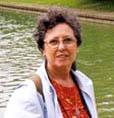Links
Archives
INDIVIDUAL VOYAGE THROUGH CHINA DURING 7 WEEKS PEKING XIAN CHENGDU CHONGQING YANGTZE RIVER MOUNTS HUANGSHAN HANGZHOU SUZHOU SHANGHAI PEKING
Wednesday, November 30, 2005
Prologue
It started walking in a park in Belgrade, when we met (my husband Milan and I) some members of the China’s embassy. Since that day we received monthly the illustrated review “China”. Soon I started to dream of that enigmatic country which doors began slowly to open and Milan accepted the risk to go to the “unknown land”.
We got three guides. LONELY PLANET contained the best informations. Gradually our itinerary was formed and finally we launched out in a fantastic adventure.
It lasted seven weeks, cost 4000km by train, 1000km by bus, 2000km by boat, 26 hours by air (Belgrade – Peking – Belgrade) – and 3.000 dollars.
Our epopee began on 17.9.1990. Every day I noted my experiences. Later, reading it again, I wondered whether it was the result of my imagination? Anyhow, so it will remain forever in my memory.
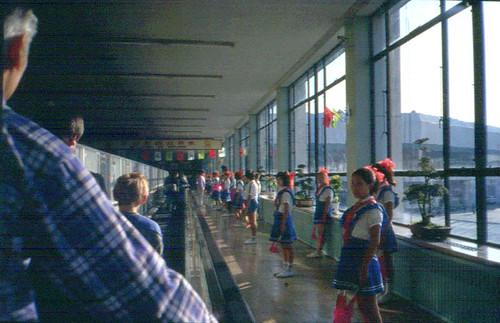
At the airport
It started walking in a park in Belgrade, when we met (my husband Milan and I) some members of the China’s embassy. Since that day we received monthly the illustrated review “China”. Soon I started to dream of that enigmatic country which doors began slowly to open and Milan accepted the risk to go to the “unknown land”.
We got three guides. LONELY PLANET contained the best informations. Gradually our itinerary was formed and finally we launched out in a fantastic adventure.
It lasted seven weeks, cost 4000km by train, 1000km by bus, 2000km by boat, 26 hours by air (Belgrade – Peking – Belgrade) – and 3.000 dollars.
Our epopee began on 17.9.1990. Every day I noted my experiences. Later, reading it again, I wondered whether it was the result of my imagination? Anyhow, so it will remain forever in my memory.

At the airport
ARRIVAL
19.9.1990
www.flickr.com/photos/jeanette
Finally in China! The train curries us away towards Xian, 1165km in the southwest of Peking but what happened until now?
Departure from Belgrade (17.9) by plane to Peking via Warsaw. The flight is calm; I’m dreaming awake. Suddenly something is going wrong. The steward pours boiling tea on Milan’s leg. The effect is relatively alarming. I am anxious and wonder was it wise to go to that unknown land if by chance we need help. Fortunately in Moscow, during a new team took the command, a doctor attended Milan and the incident was quickly forgotten.
I feel not tired flying above Peking, after a ten hours fly overlooking Siberia, Baikal Lake, Mongolian desert and The Great Wall. The pilot announces it’s 4 PM (7 hours later than in Belgrade) – temperature 22 degrees.
Feet on the ground I can’t yet realize where I am but the sounds of an Eastern music confirm my dream is coming true!
We get our luggage without problems. Outside we follow the numerous travelers we suppose are going taking a bus. So we are soon in the town center were we continue by taxi to the Ciao-Yuan Hotel, which Lonely Planet recommends. It’s a backpackers one, full of youth looking, astonished, at that “respectable pair” (55 and 65). At the reception they speak English offering us the best free room, modest but clean for 12$.
The next morning we are looking for some breakfast. What to eat? Near the hotel many pitiable snacks offer their traditional dishes but we are not disposed to taste them at this moment however we decided to live the everyday life of the common Chinese.
On our way, traveling kitchens equipped with an improvised furnace with on it, a pot “God knows what”! Finally we stay in a rank where a head cook makes giant pancakes with fine chopped leek, eggs and hot seasoning. Very good!
Now we go by bus to the center of city. Impressive are the very large and very long streets looking like a sea of bicycles accompanied by the uninterrupted sound of hundreds of bells. To reach the other side of Don-Chang-Han (80m) slipping through the cyclists is literally an exploit. Entering the railway station it’s not easy to find the right wicket with their indecipherable inscriptions. LP (Lonely planet) reports there is a separate booking office for foreigners and soon we leave the station our tickets - sleeping car – for XIAN in the pockets. It’s time for dinner. Rice, chicken, sauce, two drinks = 12yuan (2$). All around us sympathetic Chinese gently smile seeing Jeanette and Milan not able to handle chopsticks. I smile too and everything is OK. We spend the afternoon wandering up and down because we’ll visit Peking during the last days of our stay in the country. Although we have to see Tian’anmen square (it means The Door of the Celestial Peace) – impressed is that immense space which extend in front of the “Prohibited Cite”. Just here I have to confront the public toilets which (according to the guide) are not only without cabins but are also exempt of partitions! A pleasant surprise seeing the wall decorations, a rock with a fountain where swim red fishes; in the Ladies, a sofa – flowers – impeccable lavabos and cabins. Though, I wonder how it will look like elsewhere. I feel so exciting and in the same time a little afraid walking in the large commercial Wangfujing street among a crowd of thousands typical Chinese faces, to me all the same.
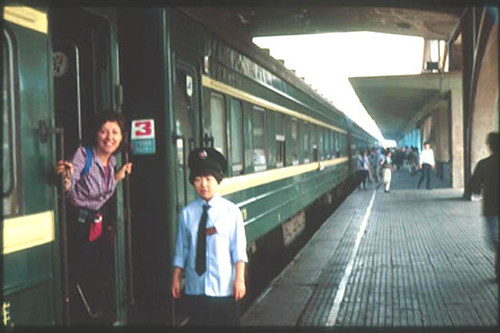
Peking station
www.flickr.com/photos/jeanette
Finally in China! The train curries us away towards Xian, 1165km in the southwest of Peking but what happened until now?
Departure from Belgrade (17.9) by plane to Peking via Warsaw. The flight is calm; I’m dreaming awake. Suddenly something is going wrong. The steward pours boiling tea on Milan’s leg. The effect is relatively alarming. I am anxious and wonder was it wise to go to that unknown land if by chance we need help. Fortunately in Moscow, during a new team took the command, a doctor attended Milan and the incident was quickly forgotten.
I feel not tired flying above Peking, after a ten hours fly overlooking Siberia, Baikal Lake, Mongolian desert and The Great Wall. The pilot announces it’s 4 PM (7 hours later than in Belgrade) – temperature 22 degrees.
Feet on the ground I can’t yet realize where I am but the sounds of an Eastern music confirm my dream is coming true!
We get our luggage without problems. Outside we follow the numerous travelers we suppose are going taking a bus. So we are soon in the town center were we continue by taxi to the Ciao-Yuan Hotel, which Lonely Planet recommends. It’s a backpackers one, full of youth looking, astonished, at that “respectable pair” (55 and 65). At the reception they speak English offering us the best free room, modest but clean for 12$.
The next morning we are looking for some breakfast. What to eat? Near the hotel many pitiable snacks offer their traditional dishes but we are not disposed to taste them at this moment however we decided to live the everyday life of the common Chinese.
On our way, traveling kitchens equipped with an improvised furnace with on it, a pot “God knows what”! Finally we stay in a rank where a head cook makes giant pancakes with fine chopped leek, eggs and hot seasoning. Very good!
Now we go by bus to the center of city. Impressive are the very large and very long streets looking like a sea of bicycles accompanied by the uninterrupted sound of hundreds of bells. To reach the other side of Don-Chang-Han (80m) slipping through the cyclists is literally an exploit. Entering the railway station it’s not easy to find the right wicket with their indecipherable inscriptions. LP (Lonely planet) reports there is a separate booking office for foreigners and soon we leave the station our tickets - sleeping car – for XIAN in the pockets. It’s time for dinner. Rice, chicken, sauce, two drinks = 12yuan (2$). All around us sympathetic Chinese gently smile seeing Jeanette and Milan not able to handle chopsticks. I smile too and everything is OK. We spend the afternoon wandering up and down because we’ll visit Peking during the last days of our stay in the country. Although we have to see Tian’anmen square (it means The Door of the Celestial Peace) – impressed is that immense space which extend in front of the “Prohibited Cite”. Just here I have to confront the public toilets which (according to the guide) are not only without cabins but are also exempt of partitions! A pleasant surprise seeing the wall decorations, a rock with a fountain where swim red fishes; in the Ladies, a sofa – flowers – impeccable lavabos and cabins. Though, I wonder how it will look like elsewhere. I feel so exciting and in the same time a little afraid walking in the large commercial Wangfujing street among a crowd of thousands typical Chinese faces, to me all the same.

Peking station
Towards Xian
20.9.1990
The following day at 1PM we step the firsts in our hard-sleep coach. Soon our traveling companions are coming too; they look at us with sympathy. They wear no luggage, probably are they on a business trip because the price of this coach is to high for the common people I suppose. Everyone is putting his goblet and tea on the small table close to the window.
When the train is starting a soft traditional music start to play. This vicinage, this unexpected ritual, these discreet manners, these bridled eyes, the melody….that’s what I dreamed of! From time to time our stewardess offers ebullient water the travelers need for tea they drink non-stop. Gradually the tongues come untied. Using their some notions of English, drawings and mimics, questions and answers go on. When we show our itinerary curious heads are leaning towards the map of China. They comment it vehemently. Their charivari is pleasant to hear but suddenly no more chattering, no more music. It’s ten o’clock; light goes out, it’s time to sleep.
It’s six o’clock. The melodious sounds of a concerto awake me. At once goblets, toothbrushes in their hands, everyone stands in the row to collect water provided by a boiler in the next coach. The rule is strict, no water if the thermometer is not at 100 degrees.
Now we are all ready to continue where we stopped last night. Milan tries to perfect his little knowledge of Chinese language. The pronunciation is very difficult. The whole company is enjoying it and laughing. It’s midday; our friends informed us Xian is not far away.
20.9.1990
The following day at 1PM we step the firsts in our hard-sleep coach. Soon our traveling companions are coming too; they look at us with sympathy. They wear no luggage, probably are they on a business trip because the price of this coach is to high for the common people I suppose. Everyone is putting his goblet and tea on the small table close to the window.
When the train is starting a soft traditional music start to play. This vicinage, this unexpected ritual, these discreet manners, these bridled eyes, the melody….that’s what I dreamed of! From time to time our stewardess offers ebullient water the travelers need for tea they drink non-stop. Gradually the tongues come untied. Using their some notions of English, drawings and mimics, questions and answers go on. When we show our itinerary curious heads are leaning towards the map of China. They comment it vehemently. Their charivari is pleasant to hear but suddenly no more chattering, no more music. It’s ten o’clock; light goes out, it’s time to sleep.
It’s six o’clock. The melodious sounds of a concerto awake me. At once goblets, toothbrushes in their hands, everyone stands in the row to collect water provided by a boiler in the next coach. The rule is strict, no water if the thermometer is not at 100 degrees.
Now we are all ready to continue where we stopped last night. Milan tries to perfect his little knowledge of Chinese language. The pronunciation is very difficult. The whole company is enjoying it and laughing. It’s midday; our friends informed us Xian is not far away.
XIAN
The cradle of cultural China
21 – 22 – 23.9.1990
www.flickr.com/photos/jeanette
Traveling 20 hours we arrive in Xian, the cradle of cultural China. Here, 200 years before Jesus-Christ, the first emperor of the united China, built its palates, its historic buildings, unfortunately destroyed during the time. The sensational discovery of 7000 soldiers in terracotta was the hook, which attracted us so far.
Bags on the backs, we slip through the thousands of travelers, curious to find the hotel recommended by L.P. At the reception they speak English. We get a clean room with bathroom, air conditioning, TV. - 70 Yuan (14$) by night. Unpacking doesn’t take a long time. First we want to go to the City Walls. LP explains the way to the bus stop. We are lucky because the numbers are written in Arab numerals just like in Peking. We walk on the imposing extremely well preserved walls, old thousands of years. In the shape of rectangle, long 12 km., they encircled the city to protect it from the invaders. Going on its wide roadway, we arrive at the Provincial Museum, once the Temple of Confucius. The museum is one of the richest in original pieces in the country.
I avow being more interested in the environment than in the vessels, sculptures and bronzes which make its notoriety. We are in a whole of pavilions connected by pretty courts and gardens. I enjoy looking at the surrounding because all is new to my eyes, different from what they are used to see…a discovery! The Forest of Steles (nearly 1500 pieces) impresses me really, splendid calligraphies, work of great Masters. This prodigious collection was instaured in 1807 by the Emperor to preserve the “Classics on Stones”. After this experience we are convinced Xian is the cradle of China’s cultural.
What a contrast, only some minutes later, entering the old city. It starts to rain, no matter; we want to see this picture of Xian. It’s the display of an intensive and animated life. It’s a pell-mell of artisans, merchants and a concurrence of small (primitive) restaurants. Nobody pay attention to the rain. Everyone continues his job; no doubt, this people lives on the Street ….possible thanks to the agreeable temperature – we are far in the south of Peking.
Curiously looking around us, smiling and sympathetic faces make us quiet relax (we are the only strangers in the corner!). Our “nihao” (hello) attracts the neighbors believing we speak their language. No matter, mimics and good will help us to get supper. We are a little sceptic because hygiene looks not to be OK. Crudeness are plunged a while in an ebullient pot at the moment we choose it, so no more problems. The owner looks at us like asking: “Do you like it”? He smiles satisfied, supposing we are.
It’s time to rest; we return to the hotel.
In 1974, 38 km. from Xian, peasants sinking a well, discovered a gallery with statues. It was the Discovery of the Century: “The asleep army of the First Emperor”
Every day thousands Chinese come to see the 7.000-foot and horse-soldiers in natural size. These are here to guard Shi huangdi, the first emperor of the unified China. He reigned from 221 B.J-C.
I can understand the respect and devotion I see in the eyes of the visitors because the regiment of soldiers individualized in their features, expressions and ranks are like reality indeed.
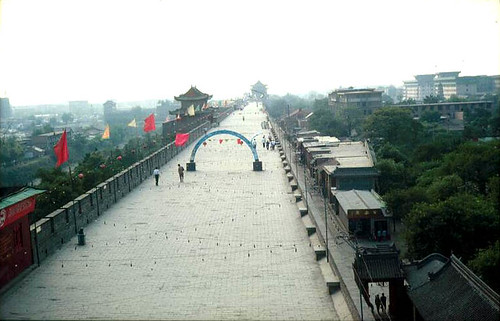
City walls
21 – 22 – 23.9.1990
www.flickr.com/photos/jeanette
Traveling 20 hours we arrive in Xian, the cradle of cultural China. Here, 200 years before Jesus-Christ, the first emperor of the united China, built its palates, its historic buildings, unfortunately destroyed during the time. The sensational discovery of 7000 soldiers in terracotta was the hook, which attracted us so far.
Bags on the backs, we slip through the thousands of travelers, curious to find the hotel recommended by L.P. At the reception they speak English. We get a clean room with bathroom, air conditioning, TV. - 70 Yuan (14$) by night. Unpacking doesn’t take a long time. First we want to go to the City Walls. LP explains the way to the bus stop. We are lucky because the numbers are written in Arab numerals just like in Peking. We walk on the imposing extremely well preserved walls, old thousands of years. In the shape of rectangle, long 12 km., they encircled the city to protect it from the invaders. Going on its wide roadway, we arrive at the Provincial Museum, once the Temple of Confucius. The museum is one of the richest in original pieces in the country.
I avow being more interested in the environment than in the vessels, sculptures and bronzes which make its notoriety. We are in a whole of pavilions connected by pretty courts and gardens. I enjoy looking at the surrounding because all is new to my eyes, different from what they are used to see…a discovery! The Forest of Steles (nearly 1500 pieces) impresses me really, splendid calligraphies, work of great Masters. This prodigious collection was instaured in 1807 by the Emperor to preserve the “Classics on Stones”. After this experience we are convinced Xian is the cradle of China’s cultural.
What a contrast, only some minutes later, entering the old city. It starts to rain, no matter; we want to see this picture of Xian. It’s the display of an intensive and animated life. It’s a pell-mell of artisans, merchants and a concurrence of small (primitive) restaurants. Nobody pay attention to the rain. Everyone continues his job; no doubt, this people lives on the Street ….possible thanks to the agreeable temperature – we are far in the south of Peking.
Curiously looking around us, smiling and sympathetic faces make us quiet relax (we are the only strangers in the corner!). Our “nihao” (hello) attracts the neighbors believing we speak their language. No matter, mimics and good will help us to get supper. We are a little sceptic because hygiene looks not to be OK. Crudeness are plunged a while in an ebullient pot at the moment we choose it, so no more problems. The owner looks at us like asking: “Do you like it”? He smiles satisfied, supposing we are.
It’s time to rest; we return to the hotel.
In 1974, 38 km. from Xian, peasants sinking a well, discovered a gallery with statues. It was the Discovery of the Century: “The asleep army of the First Emperor”
Every day thousands Chinese come to see the 7.000-foot and horse-soldiers in natural size. These are here to guard Shi huangdi, the first emperor of the unified China. He reigned from 221 B.J-C.
I can understand the respect and devotion I see in the eyes of the visitors because the regiment of soldiers individualized in their features, expressions and ranks are like reality indeed.

City walls
Towards Chengdu
23.9.1990
We leave Xian in the evening. Now we have more experience and buy easily tickets sleeping car. Our next stage is Chengdu, capital of the province of Sichuan, 885 km. in the southwest of Xian. As in the train some days ago, traditional melodies are in the air. We quickly begin to chatter with our fellow travelers. Their English is rather good, so we manage to obtain interesting informations for the next days. They recommend the Binjiang hotel reserved to the Chinese, comfortable and cheap. About the cookery in Sichuan we have to know it’s famous all over the region but extremely spiced! Now, amused, we learn to say “putchajdjo” = not to hot!!! Everybody laugh. A wonderful music is playing. I want to know the name of it; perhaps I’ll find the CD. A lady knows it but results a long discussion concerning the calligraphy. I conclude their mysterious signs are very complicated, even for this team of engineers and businessmen. They look very happy at the moment the answer is written in my notebook. So run away 18 hours not realizing we arrive in Chengdu.
23.9.1990
We leave Xian in the evening. Now we have more experience and buy easily tickets sleeping car. Our next stage is Chengdu, capital of the province of Sichuan, 885 km. in the southwest of Xian. As in the train some days ago, traditional melodies are in the air. We quickly begin to chatter with our fellow travelers. Their English is rather good, so we manage to obtain interesting informations for the next days. They recommend the Binjiang hotel reserved to the Chinese, comfortable and cheap. About the cookery in Sichuan we have to know it’s famous all over the region but extremely spiced! Now, amused, we learn to say “putchajdjo” = not to hot!!! Everybody laugh. A wonderful music is playing. I want to know the name of it; perhaps I’ll find the CD. A lady knows it but results a long discussion concerning the calligraphy. I conclude their mysterious signs are very complicated, even for this team of engineers and businessmen. They look very happy at the moment the answer is written in my notebook. So run away 18 hours not realizing we arrive in Chengdu.
CHENGDU
24.9.1990
www.flickr.com/photos/jeanette
It’s midday. The weather is mild; the sun is shining. We find easily Binjiang hotel. No problem being “not Chinese”. Milan’s passport seems to be OK; they know Yugoslavia (socialist country). They look perplex verifying mine, here is written “Bilish” (Belgium). My God! No idea where that country can be! Some consultations; we keep silent because the Chinese doesn’t like sharpness. Finally they smile saying Bilish, Bilish; we are welcome!
We take a nice room with bathroom; we refresh and soon are outside searching for a snack. Just opposite the hotel, along the Jin River, attractive little restaurants. On one of the terraces a pretty young waitress invites us, in perfect English, to taste the well-known Sichuan’s dishes. We agree her offer insisting on “putchajdjo”! We enjoy the princely dinner – a large dish of fried noodles, black mushrooms with a delicious exotic sauce. Very cheap. The prices, till now, are really low and until now the limit of our diagram of expenses is not exceeded.
Chengdu existed already 770 years B.J-C. In the second century before our era it was the capital of the kingdom of Sichuan. At that period they called it “The City of the Magistrates of the Brocarts” because its citizens manufactured brocart. Much of its traditional aspects didn’t survive the “cleaning” of the years ’50 but numerous superior institutes and its University gave rise to a cultural youth as we note walking on the large avenues bordered with plane trees. Desirous to contact foreigners, girls and boys accost us asking: “Can I help you”. It’s a pleasure looking at the charming girls defiling on their bikes on the wide spaces reserved for the cyclists and not crowded like in Peking.
Loungering all day long, on our way to the hotel, when lampions light, we arrive in a lane where young artists expose their paintings on silk. The gallery is hundreds meters long. I would like to buy a specimen of these traditional china’s paintings but we are too far from our return home. We chatter, interested in the very characteristic pictures. One of the artists tells the legend represented on a silk strip several meters long. They are here every evening they say; so we leave that nice company without regret knowing it’s not an adieu but an au-revoir.
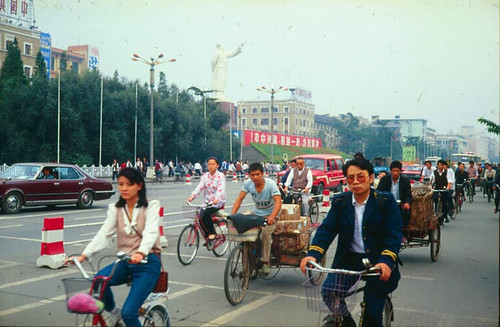
The bicycle trail
www.flickr.com/photos/jeanette
It’s midday. The weather is mild; the sun is shining. We find easily Binjiang hotel. No problem being “not Chinese”. Milan’s passport seems to be OK; they know Yugoslavia (socialist country). They look perplex verifying mine, here is written “Bilish” (Belgium). My God! No idea where that country can be! Some consultations; we keep silent because the Chinese doesn’t like sharpness. Finally they smile saying Bilish, Bilish; we are welcome!
We take a nice room with bathroom; we refresh and soon are outside searching for a snack. Just opposite the hotel, along the Jin River, attractive little restaurants. On one of the terraces a pretty young waitress invites us, in perfect English, to taste the well-known Sichuan’s dishes. We agree her offer insisting on “putchajdjo”! We enjoy the princely dinner – a large dish of fried noodles, black mushrooms with a delicious exotic sauce. Very cheap. The prices, till now, are really low and until now the limit of our diagram of expenses is not exceeded.
Chengdu existed already 770 years B.J-C. In the second century before our era it was the capital of the kingdom of Sichuan. At that period they called it “The City of the Magistrates of the Brocarts” because its citizens manufactured brocart. Much of its traditional aspects didn’t survive the “cleaning” of the years ’50 but numerous superior institutes and its University gave rise to a cultural youth as we note walking on the large avenues bordered with plane trees. Desirous to contact foreigners, girls and boys accost us asking: “Can I help you”. It’s a pleasure looking at the charming girls defiling on their bikes on the wide spaces reserved for the cyclists and not crowded like in Peking.
Loungering all day long, on our way to the hotel, when lampions light, we arrive in a lane where young artists expose their paintings on silk. The gallery is hundreds meters long. I would like to buy a specimen of these traditional china’s paintings but we are too far from our return home. We chatter, interested in the very characteristic pictures. One of the artists tells the legend represented on a silk strip several meters long. They are here every evening they say; so we leave that nice company without regret knowing it’s not an adieu but an au-revoir.

The bicycle trail
XINDU
Temple of the Divine Light
To day we go to Xindu, 20 km. far from Chengdu, to visit the Temple of the Divine Light. Interesting is the monastery with it’s young and old visitors dressed in their national costumes of the region. We saunter between the pavilions like in the Temple of Confucius (Xian), but here is the open space invaded by luxuriant vegetation for the reason we are in a subtropical region. Mystic is the environment with the emanations of the incense burned by the pilgrims among bizarre symbolic bronzes. Here we can see a beautiful pagoda of twelve stages, holy place where relics are preserved, inaccessible to the public.
In one of the pavilions, three young bonzes, cranium shaved, naked feet in sandals, wrapped in their red dresses are sitting near a splendid lying Buddha of jade. They are drawing calligraphies with their brushes. I approach, they are indifferent, concentrated. Perhaps is it their thesis they are preparing because this monastery is a center of studies of Buddhism.
Continuing our exploring we see a merry group of youth sitting at the terrace of a building utilized as restaurant. How shall we order a meal and get a ticket? I’m looking at the group of scholars picking a big fish. I smile pointing out the fish, give them my notebook and a pencil ….they understand …..Soon we are enjoying two excellent stuffed and sauced fishes with “mifan” (rice) of course. The dessert is also mifan but with caramel. A feast for 6 yuan (1,2 $) beer included!
Before leaving Xindu we walk in the forest of bamboos that surrounds the temple. There, in the calm, we go silent reminding the pleasant issued hours. At sun setting we return to meet again, at the gallery, our yesterday’s friends.
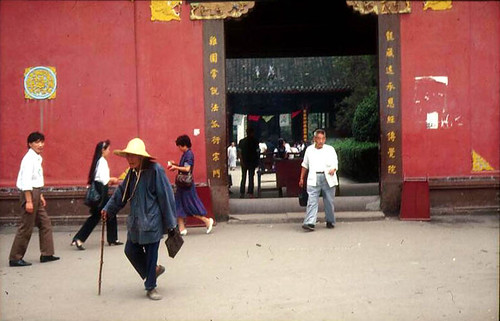
Temple of the Divine Light
Temple of the Divine Light
To day we go to Xindu, 20 km. far from Chengdu, to visit the Temple of the Divine Light. Interesting is the monastery with it’s young and old visitors dressed in their national costumes of the region. We saunter between the pavilions like in the Temple of Confucius (Xian), but here is the open space invaded by luxuriant vegetation for the reason we are in a subtropical region. Mystic is the environment with the emanations of the incense burned by the pilgrims among bizarre symbolic bronzes. Here we can see a beautiful pagoda of twelve stages, holy place where relics are preserved, inaccessible to the public.
In one of the pavilions, three young bonzes, cranium shaved, naked feet in sandals, wrapped in their red dresses are sitting near a splendid lying Buddha of jade. They are drawing calligraphies with their brushes. I approach, they are indifferent, concentrated. Perhaps is it their thesis they are preparing because this monastery is a center of studies of Buddhism.
Continuing our exploring we see a merry group of youth sitting at the terrace of a building utilized as restaurant. How shall we order a meal and get a ticket? I’m looking at the group of scholars picking a big fish. I smile pointing out the fish, give them my notebook and a pencil ….they understand …..Soon we are enjoying two excellent stuffed and sauced fishes with “mifan” (rice) of course. The dessert is also mifan but with caramel. A feast for 6 yuan (1,2 $) beer included!
Before leaving Xindu we walk in the forest of bamboos that surrounds the temple. There, in the calm, we go silent reminding the pleasant issued hours. At sun setting we return to meet again, at the gallery, our yesterday’s friends.

Temple of the Divine Light
CHENGDU 2
The Eden
26 –27.1990
It’s Sunday. The whole city seems to walk and strut in the numerous cha-dian (tea rooms) and cha-yuan (tea gardens), which also make the reputation of Chengdu. This town seems to be the Eden!
I am very happy feeling such a security around us. Once more I believe in the complete success of our journey. It’s difficult to find a free seat in these places of predilection where, in armchairs of bamboo, relaxed Chinese taste white tea (hot water) and green tea. Since our arrival in the country we were told to drink only boiled water. We already noticed in public places enormous boilers severely kept to avoid the consummation of water before it reaches 100 degrees.
No free chairs in the cha-yuan in Park Renmin (Park of the people). Two young “gallants” – fashioned jeans, elegant shirts - invite us at their table. One is an English teacher, the other a tourist guide. Many questions on both sides but nothing about politics because the events of Tian’anmen are not fare in the past (1989). We have to be prudent, who knows…we order green tea. In a miniature porcelain cup swim some leaves in hot water. At the moment the cup is empty one of the girls trotting with a kettle between the tables, refill it.
After our friends are leaving we stay to rest our legs just near the lake with its interesting boats like dragons on it. My thoughts go to Du Fu (712-770) and his contemporary Li Bai, the two most famous Chinese poets. Du Fu wandered through China ending in a cot in Chengdu where he composed 240 poems. He was very sensitive to the misfortune of the people (misery, famine). One of his poems finished with the question: “When will there be palates of thousands and ten thousands rooms to shelter all poor lettered men of the empire and in which we will see nothing else than smiling faces”. I think if Nirvana exists, at this moment the great poet has to be happy there above in the sky!
We get up early to explore the ancient quarters with their narrow lanes and old traditional houses. Old men rest on the sill of their home, most of them dressed like in Mao’s time, the gray time. Some sitting on small low chairs play domino and enjoy their “white tea”!
Wandering at random we arrive on a street we’ll name “Tailors street” because at both sides, on the pavement, seamstresses are working. Each of them has a sewing machine they slip in the evening in a box in the wall. It’s the moment to shorten the sleeves of a shirt I bought here in Chengdu. The job is done in a trice. Very good done. “Duo chao”? (How much)…2 yuan (1/2 $)!!! I give here 4 yuan. Follows “ksie, ksie” (thank you) from both sides.
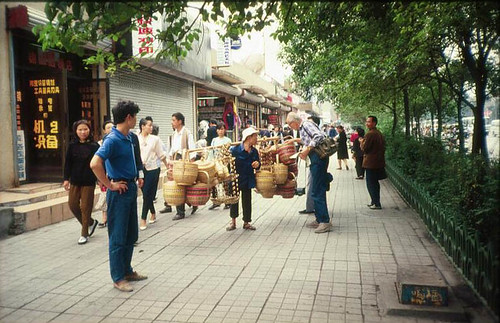
On the street
The Eden
26 –27.1990
It’s Sunday. The whole city seems to walk and strut in the numerous cha-dian (tea rooms) and cha-yuan (tea gardens), which also make the reputation of Chengdu. This town seems to be the Eden!
I am very happy feeling such a security around us. Once more I believe in the complete success of our journey. It’s difficult to find a free seat in these places of predilection where, in armchairs of bamboo, relaxed Chinese taste white tea (hot water) and green tea. Since our arrival in the country we were told to drink only boiled water. We already noticed in public places enormous boilers severely kept to avoid the consummation of water before it reaches 100 degrees.
No free chairs in the cha-yuan in Park Renmin (Park of the people). Two young “gallants” – fashioned jeans, elegant shirts - invite us at their table. One is an English teacher, the other a tourist guide. Many questions on both sides but nothing about politics because the events of Tian’anmen are not fare in the past (1989). We have to be prudent, who knows…we order green tea. In a miniature porcelain cup swim some leaves in hot water. At the moment the cup is empty one of the girls trotting with a kettle between the tables, refill it.
After our friends are leaving we stay to rest our legs just near the lake with its interesting boats like dragons on it. My thoughts go to Du Fu (712-770) and his contemporary Li Bai, the two most famous Chinese poets. Du Fu wandered through China ending in a cot in Chengdu where he composed 240 poems. He was very sensitive to the misfortune of the people (misery, famine). One of his poems finished with the question: “When will there be palates of thousands and ten thousands rooms to shelter all poor lettered men of the empire and in which we will see nothing else than smiling faces”. I think if Nirvana exists, at this moment the great poet has to be happy there above in the sky!
We get up early to explore the ancient quarters with their narrow lanes and old traditional houses. Old men rest on the sill of their home, most of them dressed like in Mao’s time, the gray time. Some sitting on small low chairs play domino and enjoy their “white tea”!
Wandering at random we arrive on a street we’ll name “Tailors street” because at both sides, on the pavement, seamstresses are working. Each of them has a sewing machine they slip in the evening in a box in the wall. It’s the moment to shorten the sleeves of a shirt I bought here in Chengdu. The job is done in a trice. Very good done. “Duo chao”? (How much)…2 yuan (1/2 $)!!! I give here 4 yuan. Follows “ksie, ksie” (thank you) from both sides.

On the street
LESHAN
The big Buddha
28 – 29.9.1990
It seems it will be a beautiful day. We leave the hotel at 7 o’clock to take the minibus going to Leshan, 173 km. in the southwest of Chengdu. On our way, crossing a park, we fall in with a group practicing the famous Chinese boxing. Their slow harmonious synchronized movements look like a ballet. On the trees canaries singing in their cages seem enjoy their master’s exhibitions. We have to leave the spectacle…
Sitting on the first places in the bus we have the opportunity to see the chaos on the road, especially approaching villages. The bus hardly progress between the crowds. Indifferent to the horn of our driver are the two-wheeled vehicles overloaded with agricultural produces in enormous bamboo baskets. In improvised carts struggle corded pigs. Bound hens and ducks desperately flutter on bikes... our driver keep cool and finally we enter a calm zone.
Now we are crossing fields where peasants plow using plough drawn by buffaloes. Also defile immense rice and cotton fields, sugar-cane plantations. It’s the image of the famous basin of Chengdu whose fertility is legendary, where they harvest rice, corn, soja, twice a year, where vegetables grow throughout the year.
Now I understand the welfare of Chengdu, it’s the reflection of this formidable production machine. In a village I can’t refraim from tasting sugar cane. In a trice the merchant peels the long green stem, now it’s white. He cuts it in fragments that look like barley sugar. I nibble sucking the juice from it. It’s sweet and refreshing! At least drug fibres are left to be thrown.
The configuration of the landscape changes. Now we travel between tea gardens terraced on the hills. About midday we arrive in Leshan. We want to buy tickets for our return. Impossible to be understood. Somebody in the row seems to realize we need tickets for Chengdu. We get them but wonder whether they are for the right direction. We have no choice and put them in the pockets. A woman accosts us showing a prospectus of a hotel and beckons to follow her. The prices in dollars are suitable; we accept. Milan with his long legs has no problems but I have; my backpack is not light so I reach difficultly the lady in a race cross narrow streets and a crowded market; I am afraid to be lost among that rout. Thank God, we arrive; we like the place and settle.
The days are long; we have still time to visit the tallest Buddha in the world. At the landing on the Min River we stand in the long row of very disciplined native tourists. The boat, which takes us to the other side of the river stops in the middle of the Min just in front of the Buddha. I have the opportunity to survey the gigantic and imposing 71 meters high colosse carved in the cliff, from 713 to 803, above the confluence of three rivers. It was conceived in hope it would decrease the stream and assure the safety of the boats!
Landing, we enter a bamboos forest. Sinuous climbing paths in a luxuriant vegetation lead to a complex of old temples where the pilgrims venerate numerous Buddha, light candles and burn incense. On the way many small restaurants and buffets are crowded because it’s very cheap. Everywhere and anytime we can see food in abundance. Away is the time when China was synonymous of Famine.
Now we go down on steps cut in the cliff, through tunnels and corridors. Sometimes we have a view on the river and the landscape. Being near the foot of the statue young tourists who climbed on it smiling tend their hands to help me to get up too. Impressed. As yet I didn’t realize how big it really was. Now we have to go upper on abrupt staircases and arrive near the head of this twelve centuries old Buddha. A little out of breath, leaning on the slope protecting me from the depth, I whisper him how long I traveled to see him and ask to bless me!!!
Happy and enriched by this new experience we stop a pedicab to bring us to the hotel.
The following day again in Chengdu but just to say “adieu” to the city and his people I enjoyed so much. I expect excited the next round waiting the Sichuan Express, direction Chongqing from where will start our cruising on Yang Tse-Kiang we call Yangtze River.
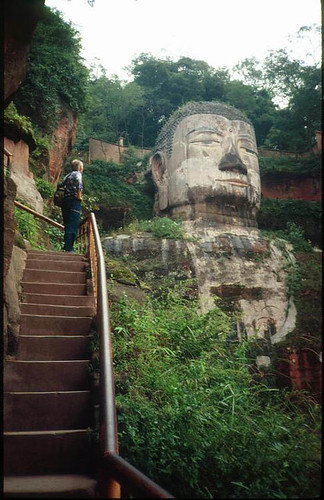
Near Buddha
The big Buddha
28 – 29.9.1990
It seems it will be a beautiful day. We leave the hotel at 7 o’clock to take the minibus going to Leshan, 173 km. in the southwest of Chengdu. On our way, crossing a park, we fall in with a group practicing the famous Chinese boxing. Their slow harmonious synchronized movements look like a ballet. On the trees canaries singing in their cages seem enjoy their master’s exhibitions. We have to leave the spectacle…
Sitting on the first places in the bus we have the opportunity to see the chaos on the road, especially approaching villages. The bus hardly progress between the crowds. Indifferent to the horn of our driver are the two-wheeled vehicles overloaded with agricultural produces in enormous bamboo baskets. In improvised carts struggle corded pigs. Bound hens and ducks desperately flutter on bikes... our driver keep cool and finally we enter a calm zone.
Now we are crossing fields where peasants plow using plough drawn by buffaloes. Also defile immense rice and cotton fields, sugar-cane plantations. It’s the image of the famous basin of Chengdu whose fertility is legendary, where they harvest rice, corn, soja, twice a year, where vegetables grow throughout the year.
Now I understand the welfare of Chengdu, it’s the reflection of this formidable production machine. In a village I can’t refraim from tasting sugar cane. In a trice the merchant peels the long green stem, now it’s white. He cuts it in fragments that look like barley sugar. I nibble sucking the juice from it. It’s sweet and refreshing! At least drug fibres are left to be thrown.
The configuration of the landscape changes. Now we travel between tea gardens terraced on the hills. About midday we arrive in Leshan. We want to buy tickets for our return. Impossible to be understood. Somebody in the row seems to realize we need tickets for Chengdu. We get them but wonder whether they are for the right direction. We have no choice and put them in the pockets. A woman accosts us showing a prospectus of a hotel and beckons to follow her. The prices in dollars are suitable; we accept. Milan with his long legs has no problems but I have; my backpack is not light so I reach difficultly the lady in a race cross narrow streets and a crowded market; I am afraid to be lost among that rout. Thank God, we arrive; we like the place and settle.
The days are long; we have still time to visit the tallest Buddha in the world. At the landing on the Min River we stand in the long row of very disciplined native tourists. The boat, which takes us to the other side of the river stops in the middle of the Min just in front of the Buddha. I have the opportunity to survey the gigantic and imposing 71 meters high colosse carved in the cliff, from 713 to 803, above the confluence of three rivers. It was conceived in hope it would decrease the stream and assure the safety of the boats!
Landing, we enter a bamboos forest. Sinuous climbing paths in a luxuriant vegetation lead to a complex of old temples where the pilgrims venerate numerous Buddha, light candles and burn incense. On the way many small restaurants and buffets are crowded because it’s very cheap. Everywhere and anytime we can see food in abundance. Away is the time when China was synonymous of Famine.
Now we go down on steps cut in the cliff, through tunnels and corridors. Sometimes we have a view on the river and the landscape. Being near the foot of the statue young tourists who climbed on it smiling tend their hands to help me to get up too. Impressed. As yet I didn’t realize how big it really was. Now we have to go upper on abrupt staircases and arrive near the head of this twelve centuries old Buddha. A little out of breath, leaning on the slope protecting me from the depth, I whisper him how long I traveled to see him and ask to bless me!!!
Happy and enriched by this new experience we stop a pedicab to bring us to the hotel.
The following day again in Chengdu but just to say “adieu” to the city and his people I enjoyed so much. I expect excited the next round waiting the Sichuan Express, direction Chongqing from where will start our cruising on Yang Tse-Kiang we call Yangtze River.

Near Buddha
CHONGQING
Doubble Happiness
30.9 – 1.10.1990
www.flickr.com/photos/jeanette
This time we didn’t succeed to get places in the sleeping car. On the platform the crowd who rush to the coaches “hard seats” pushed us so furiously I was literally carried by the mob. How we got a seat I don’t know. What an adventure! I was especially afraid to be lost in the crowd; what would I do? I prefer not imagine it. Chongqing is 500 km. south of Chengdu. The coach is without compartments. Sitting on wooden benches I wonder how feel the travelers so thronged they haven’t enough space to lean both feet on the ground. For my part I’m spending a night with no end. Atrocious backache keeps me awake. Impossible to move, to stand up. I implore Buddha and all the gods to attain the end as soon as possible!
It’s 5 o’clock in the morning; it’s still night. Far from seeing tired the travelers hustle to get out of the train. Then it’s the rush towards the exit. Overpowered by this dreadful night I go like a sleepwalker, my rucksack tossing on my shoulders, in the maze of this lugubrious station in rebuilding. Chongqing, which means Double Happiness, does not make me happy in these early hours.
On the street a thick fog accentuates my gloomy mood. Where to go seeing nothing around. Milan applies to an employee …illusion! He speaks only Chinese. However he wants to help us. It’s very complicated because we need to take a funicular to go to the bus stop. He draws the way we have to go on. Milan clears up once more; he finds out the bus. The conductor seems to know the name of the hotel (LP recommended) we show him. Indeed he signals we have to step out. A good-looking man tell us, using mimicries, he will show the way. We accept with pleasure. Going on we wonder was it wise to follow this man in these dark deserted streets. At the moment we began to doubt his honesty he turns round showing the ensign of our hotel – Binguan Hotel! No word, he respectfully bows to mean an adieu. No time for thanks…he already turned back disappearing in the fog… a spontaneous kindness I’ll certainly remain for ever.
At the reception they speak English. The room (16$) is very comfortable, very clean. The aches of the terrible night are definitively forgotten after a beneficent bath and restoring sleep.
It’s raining. We have to get tickets for our cruising. We decide to travel in first class in spite of the cost we didn’t foresee; a German girl we met in Chengdu had warned us of the discomfort and dirtiness of the second class. The boat leaves in two days. Protected under our umbrellas we go down to the strand. I am horrified seeing in the rain pitiful men, women, young and old, bowed under the weight of their yoke charging and discharging the numerous barges which supply Chongqing, one of the biggest industrial cities in China. I don’t know whether I dream or not. Perhaps was Chengdu with its happy air and its tea gardens a dream?
Milan takes me away from the sad scene to explore the high city perched on a cliff, which overlooks the Jianling flowing into the Yang Tse-Kiang. We arrive there by wasted century staircases. I don’t like this town, nothing attractive. On the sloped streets, no bicycles and the tinkling of their bells! Although a pleasant memory of the city “Double Happiness” will stay after a sympathy evening in the company of some charming students.
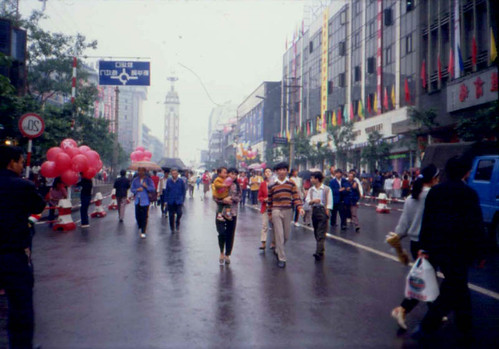
National Day
30.9 – 1.10.1990
www.flickr.com/photos/jeanette
This time we didn’t succeed to get places in the sleeping car. On the platform the crowd who rush to the coaches “hard seats” pushed us so furiously I was literally carried by the mob. How we got a seat I don’t know. What an adventure! I was especially afraid to be lost in the crowd; what would I do? I prefer not imagine it. Chongqing is 500 km. south of Chengdu. The coach is without compartments. Sitting on wooden benches I wonder how feel the travelers so thronged they haven’t enough space to lean both feet on the ground. For my part I’m spending a night with no end. Atrocious backache keeps me awake. Impossible to move, to stand up. I implore Buddha and all the gods to attain the end as soon as possible!
It’s 5 o’clock in the morning; it’s still night. Far from seeing tired the travelers hustle to get out of the train. Then it’s the rush towards the exit. Overpowered by this dreadful night I go like a sleepwalker, my rucksack tossing on my shoulders, in the maze of this lugubrious station in rebuilding. Chongqing, which means Double Happiness, does not make me happy in these early hours.
On the street a thick fog accentuates my gloomy mood. Where to go seeing nothing around. Milan applies to an employee …illusion! He speaks only Chinese. However he wants to help us. It’s very complicated because we need to take a funicular to go to the bus stop. He draws the way we have to go on. Milan clears up once more; he finds out the bus. The conductor seems to know the name of the hotel (LP recommended) we show him. Indeed he signals we have to step out. A good-looking man tell us, using mimicries, he will show the way. We accept with pleasure. Going on we wonder was it wise to follow this man in these dark deserted streets. At the moment we began to doubt his honesty he turns round showing the ensign of our hotel – Binguan Hotel! No word, he respectfully bows to mean an adieu. No time for thanks…he already turned back disappearing in the fog… a spontaneous kindness I’ll certainly remain for ever.
At the reception they speak English. The room (16$) is very comfortable, very clean. The aches of the terrible night are definitively forgotten after a beneficent bath and restoring sleep.
It’s raining. We have to get tickets for our cruising. We decide to travel in first class in spite of the cost we didn’t foresee; a German girl we met in Chengdu had warned us of the discomfort and dirtiness of the second class. The boat leaves in two days. Protected under our umbrellas we go down to the strand. I am horrified seeing in the rain pitiful men, women, young and old, bowed under the weight of their yoke charging and discharging the numerous barges which supply Chongqing, one of the biggest industrial cities in China. I don’t know whether I dream or not. Perhaps was Chengdu with its happy air and its tea gardens a dream?
Milan takes me away from the sad scene to explore the high city perched on a cliff, which overlooks the Jianling flowing into the Yang Tse-Kiang. We arrive there by wasted century staircases. I don’t like this town, nothing attractive. On the sloped streets, no bicycles and the tinkling of their bells! Although a pleasant memory of the city “Double Happiness” will stay after a sympathy evening in the company of some charming students.

National Day
YANG TSE-KIANG
The Three Gorges
2 – 3 – 4.10.1990
www.flickr.com/photos/jeanette
We go on shipboard on departure eve to avoid getting up early next morning. I am very excited entering the small cabin of the San Xia (Three Canyons), boat with four bridges, 70m. long, 15m. broad. It will bring us to Wuhan – 1.350km. I’m glad to rest, sailing on the Yangtze after those fifteen days wandering. At 8 o’clock a slow siren awakes us; they weight anchor. I see looking through the scuttle, moving away, in the fog, the sad medieval city perched on the rock. I remind its people on the strike, bowed beneath their burden. Sad memories of Chongqing. Gloomy weather incites me to idle to day sailing in the direction of Shanghai (where we’ll arrive by another way). The people call this river Chang Jiang (Large River) because it’s the longest river on world (6.000km.) after the Amazon and the Nile. In the evening San Xia anchors.
Yet at dawn I feel it will be a splendid day. The sunshine invites us early in the morning to go on the deck where any notables are still installed in their armchairs expecting the Canyons. Milan sitting near me, keep silent, we communicate by mind. It’s quiet around us; I only hear the commotion of water caused by the boat. The quietness stops when we approach villages along the coast. On the strand crowd is waiting the boat, some to offer their goods to the passengers, others to embark. Over pontoon bridges go first those who arrived at their destination, then embark pitiful travelers overloaded with packages and enormous bamboo baskets. Women carrying bales on their heads drag children clutched on their skirts. From the boat some rush to the bank to buy something though it’s possible to purchase by air! How? From the bank villagers offer fruit, roasted chickens, wafers, fritters…carpets…Prices are signalized with the fingers. Goods are thrown in lucky hands and then is the money sent by air too! Assiduous sellers enter the river, arms raised, holding a plate with their products. The scene – gesticulations and cackling concert are amusing but in a way sad to me.
The landscape turns more and more wild; the canyons are in front of us. Standing on the head I follow apprehensively the evolutions of the San Xia. On both sides rise mountains, some 1.000m. high. Sometimes, when the river gets very narrow and the rocky chains are so close, the wonder mingles with fright, especially when the river seems not to have an issue. Then appears a buckle and our ship expertly slips through the dangerous passages which are marked by beacons to avoid the rocks invisible on the surface of the water. At a moment I think how lucky I am to enjoy these wonders, safe from dangers, whereas before the construction of the dam, sank in these calamitous canyons hundreds of boats carrying away thousands of lives.
At the end of about 200km. of slalom our San Xia enters calmer water, widening up to two kilometers. In the evening we put in. Yet 500km. to float till Wuhan.
The third day - sunny – is not diversified. A favorable opportunity to meditate and enjoy the welfare.
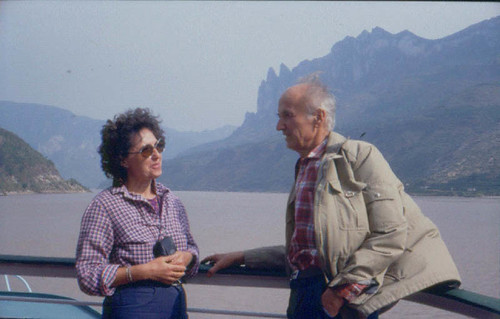
We are
2 – 3 – 4.10.1990
www.flickr.com/photos/jeanette
We go on shipboard on departure eve to avoid getting up early next morning. I am very excited entering the small cabin of the San Xia (Three Canyons), boat with four bridges, 70m. long, 15m. broad. It will bring us to Wuhan – 1.350km. I’m glad to rest, sailing on the Yangtze after those fifteen days wandering. At 8 o’clock a slow siren awakes us; they weight anchor. I see looking through the scuttle, moving away, in the fog, the sad medieval city perched on the rock. I remind its people on the strike, bowed beneath their burden. Sad memories of Chongqing. Gloomy weather incites me to idle to day sailing in the direction of Shanghai (where we’ll arrive by another way). The people call this river Chang Jiang (Large River) because it’s the longest river on world (6.000km.) after the Amazon and the Nile. In the evening San Xia anchors.
Yet at dawn I feel it will be a splendid day. The sunshine invites us early in the morning to go on the deck where any notables are still installed in their armchairs expecting the Canyons. Milan sitting near me, keep silent, we communicate by mind. It’s quiet around us; I only hear the commotion of water caused by the boat. The quietness stops when we approach villages along the coast. On the strand crowd is waiting the boat, some to offer their goods to the passengers, others to embark. Over pontoon bridges go first those who arrived at their destination, then embark pitiful travelers overloaded with packages and enormous bamboo baskets. Women carrying bales on their heads drag children clutched on their skirts. From the boat some rush to the bank to buy something though it’s possible to purchase by air! How? From the bank villagers offer fruit, roasted chickens, wafers, fritters…carpets…Prices are signalized with the fingers. Goods are thrown in lucky hands and then is the money sent by air too! Assiduous sellers enter the river, arms raised, holding a plate with their products. The scene – gesticulations and cackling concert are amusing but in a way sad to me.
The landscape turns more and more wild; the canyons are in front of us. Standing on the head I follow apprehensively the evolutions of the San Xia. On both sides rise mountains, some 1.000m. high. Sometimes, when the river gets very narrow and the rocky chains are so close, the wonder mingles with fright, especially when the river seems not to have an issue. Then appears a buckle and our ship expertly slips through the dangerous passages which are marked by beacons to avoid the rocks invisible on the surface of the water. At a moment I think how lucky I am to enjoy these wonders, safe from dangers, whereas before the construction of the dam, sank in these calamitous canyons hundreds of boats carrying away thousands of lives.
At the end of about 200km. of slalom our San Xia enters calmer water, widening up to two kilometers. In the evening we put in. Yet 500km. to float till Wuhan.
The third day - sunny – is not diversified. A favorable opportunity to meditate and enjoy the welfare.

We are
WUHAN
4.10.1990
Our boat accosts around six in the afternoon. Wuhan is a large industrial town (4 million inhabitants) with a very important port from where the river traffic is very dense. So we stay with Mr. Tchen Li, businessman, who wants to help us getting tickets for Guichi, which will be the end of our cruising. We enter an immense place as full as an egg with so many wickets and inscriptions (Chinese of course!) we would never get tickets. Even Mr. Tchen Li moved a long hour to resolve our problem. He is so kind attending us to the bus. Then, like the man in Chongqing, respectfully bows wishing us bon voyage. We are impressed with the manner he helped us. Instinctively we bow too saying ksie – ksie (thank you).
On the bus, the same scenario like in Chongqing. Showing the name of our hotel a man says: “Go with me”! It’s getting night. We follow our guide cross dark narrow streets. He goes quickly. I am curious to feel this unusual evening atmosphere; I see through open doors families gaily talking and enjoying their modest evening meals the smell reach to us. Milan, suspicious, doesn’t like it…suddenly we end in a large avenue. Two steps from our hotel! Our gentle guide doesn’t realize (fortunately!) Milan’s thoughts and smiling, like Mr. Tchen Li, bows and say “zaidjan” (good bye).
Before coming in China, the unknown, I read superficially about the Confucianism. Now I conclude the behavior of this people must have his roots in the Confucians moral which marked the Chinese soul during more than two millennia.
We are at the end of our troubles we think because at the reception a nice hostess does speak English. The room? A dirty hole! Where to go in the night? I request to change the sheets where I see the traces of the precedents. Quickly in bed I ignore the dirty walls, the cloth line above my head, the shabby lamp on the ceiling and God knows what else! and close my eyes to think only about the nice moments of the last days.
Early in bed, early up. We hurry to arrive in time at the wharfs. Impossible to find the bus stop. Nobody on the street who speaks English. The good will passers say “meo, meo” (not,not). Milan draws a boat followed by a question mark. No answer. Now is coming a housewife charged with her provision bag. She seems to know where the bus is. We follow her. She feasts us with fritters she has in her bag. We walk a good time when she enter a house, come out without her bag and hurry us further. I just decided to give up, when we arrive…at the departure platform! She triumphantly point out the boat…she was right. Milan had designed a boat. Out of breath but gracefully, we say “ ksie, ksie” deeply moved once more by this absolute kindness.
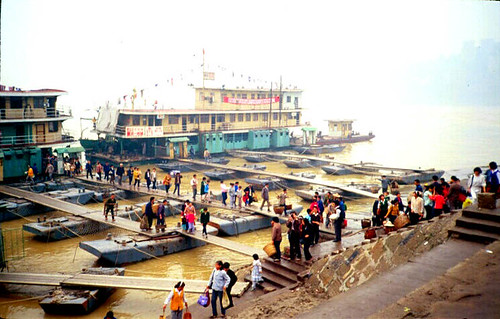
The quay
4.10.1990
Our boat accosts around six in the afternoon. Wuhan is a large industrial town (4 million inhabitants) with a very important port from where the river traffic is very dense. So we stay with Mr. Tchen Li, businessman, who wants to help us getting tickets for Guichi, which will be the end of our cruising. We enter an immense place as full as an egg with so many wickets and inscriptions (Chinese of course!) we would never get tickets. Even Mr. Tchen Li moved a long hour to resolve our problem. He is so kind attending us to the bus. Then, like the man in Chongqing, respectfully bows wishing us bon voyage. We are impressed with the manner he helped us. Instinctively we bow too saying ksie – ksie (thank you).
On the bus, the same scenario like in Chongqing. Showing the name of our hotel a man says: “Go with me”! It’s getting night. We follow our guide cross dark narrow streets. He goes quickly. I am curious to feel this unusual evening atmosphere; I see through open doors families gaily talking and enjoying their modest evening meals the smell reach to us. Milan, suspicious, doesn’t like it…suddenly we end in a large avenue. Two steps from our hotel! Our gentle guide doesn’t realize (fortunately!) Milan’s thoughts and smiling, like Mr. Tchen Li, bows and say “zaidjan” (good bye).
Before coming in China, the unknown, I read superficially about the Confucianism. Now I conclude the behavior of this people must have his roots in the Confucians moral which marked the Chinese soul during more than two millennia.
We are at the end of our troubles we think because at the reception a nice hostess does speak English. The room? A dirty hole! Where to go in the night? I request to change the sheets where I see the traces of the precedents. Quickly in bed I ignore the dirty walls, the cloth line above my head, the shabby lamp on the ceiling and God knows what else! and close my eyes to think only about the nice moments of the last days.
Early in bed, early up. We hurry to arrive in time at the wharfs. Impossible to find the bus stop. Nobody on the street who speaks English. The good will passers say “meo, meo” (not,not). Milan draws a boat followed by a question mark. No answer. Now is coming a housewife charged with her provision bag. She seems to know where the bus is. We follow her. She feasts us with fritters she has in her bag. We walk a good time when she enter a house, come out without her bag and hurry us further. I just decided to give up, when we arrive…at the departure platform! She triumphantly point out the boat…she was right. Milan had designed a boat. Out of breath but gracefully, we say “ ksie, ksie” deeply moved once more by this absolute kindness.

The quay
End of our Cruising
5.10.1990
We get like on the San Xia a two berths cabin where we reach passing close the cheap dormitories in the bottom of the boat. There, pitiful travelers among their packages, baskets etc. Soon the motors start to hum. We go off the bank navigating to Guichi, a small port where the large boats do not put in.
Sitting on the sunny deck we enjoy our last hours of rest on The Large River. I am already in thought with the Mounts Huangshan, the chief point in search of the unknown. Being inveterate mountain walkers we couldn’t resist the call of that magic mountain Li Bai (poet I cited during our stay in Chengdu) lauded in several poems. It became a high tourist place. It’s easy to reach there from Shanghai but it would be a long way round. From Guichi we can go there by bus – 180km. Unfortunately in LP nothing about this. We are informed there is a bus at 7AM. Waiting that new experience we talk with our neighbor, a young intellectual. He is as gallant as charming, sportily dressed, very elegant! It’s the opportunity to note new “crafts” to ease the rest of our voyage. About midnight something is wrong in the corner near my head. I awake Milan who finds a mouse in my night table! No more sleep until the early morning when we accost at Guichi.
5.10.1990
We get like on the San Xia a two berths cabin where we reach passing close the cheap dormitories in the bottom of the boat. There, pitiful travelers among their packages, baskets etc. Soon the motors start to hum. We go off the bank navigating to Guichi, a small port where the large boats do not put in.
Sitting on the sunny deck we enjoy our last hours of rest on The Large River. I am already in thought with the Mounts Huangshan, the chief point in search of the unknown. Being inveterate mountain walkers we couldn’t resist the call of that magic mountain Li Bai (poet I cited during our stay in Chengdu) lauded in several poems. It became a high tourist place. It’s easy to reach there from Shanghai but it would be a long way round. From Guichi we can go there by bus – 180km. Unfortunately in LP nothing about this. We are informed there is a bus at 7AM. Waiting that new experience we talk with our neighbor, a young intellectual. He is as gallant as charming, sportily dressed, very elegant! It’s the opportunity to note new “crafts” to ease the rest of our voyage. About midnight something is wrong in the corner near my head. I awake Milan who finds a mouse in my night table! No more sleep until the early morning when we accost at Guichi.
GHUICHI
A dignified people.
6.10.1990
www.flickr.com/photos/jeanette
Five o’clock in the morning. We land. It’s dark. After sleepless hours I shiver in the cold and wet night. We’ll go to the bus stop at daybreak. In the large waiting room of the port, travelers, lying on benches, stay up and come near us. It’s a group of strange fellows with a silly air, dressed poorly but warmly: padded jackets and boots. They seem examine us like two extraterrestrial creatures. Hesitating hands touch our bags, our clothes…their comments are articulated slowly and gutturally. They don’t look aggressive. Perhaps we are the first Westerns they see!? We don’t say anything and don’t move. Here we have no chance to be informed about the bus and go outside. A lugubrious environment. A wide earthy place where walk some similar fellows like those inside. We go towards a dilapidated motor tricycle and his driver. We say “Huang Shan”; smiling he invites us to sit on his “self-made” trailer. It’s a non-sense we think – 180km - on this way! Time past, soon 7’oclock. Despaired we are because “no bus in the horizon”; then suddenly appears a lady dressed officially. No English but Milan draws a bus and the calligraphy of Huangshan. Now she writes “5km” between Huangshan and the bus! No more questions. We “jump” in the self-made taxi surrounded by a merry sympathetic company.
It’s very cold sitting in the open trailer; no matter we are too glad to feel it. At the bus station our driver help us to buy tickets. He looks very satisfied and vehement refuse to accept the pourboire (drink-money) we insist to favor him. I can’t believe it, infinitely helpful and dignified.
Our minibus, a ruin. Our seats are pretty good but the others are rather holes than seats! Windows: no glass. The bus is full as an egg but nobody looks angry or nervous. On the way when we stop some more succeed to enter with enormous baskets and other. It’s a circus! Under my seat I can hear a sweet gossiping duck. I wonder how our poor vehicle holds out on these abominable roads. The spectacle of the encumbered roads is fascinating. Sometimes we pass over a carpet of spike of corn, farther they sweep the grains away. Surprises on each corner! On this trip I have he opportunity to experience the traditional Chinese toilets. In a village we stop. I follow some women I suppose going to the toilets. Several of them enter together in a small edifice and entering myself I am in the company of these “ladies” squatted side by side above a channel doing what they have to do! Jeanette wanted to live like the common Chinese….here she does! Anyhow after this experience I don’t feel badly.
We arrive in the afternoon (130km. – 7 hours) at the base camp alt. 670m. A nice comfortable room at the Tao-Yuan Hotel (=Thermal Springs) is welcome. Indefatigable and impatient, we explore the neighborhoods from where will start the conquest of the famous mountain sang by so many poets since centuries and centuries.
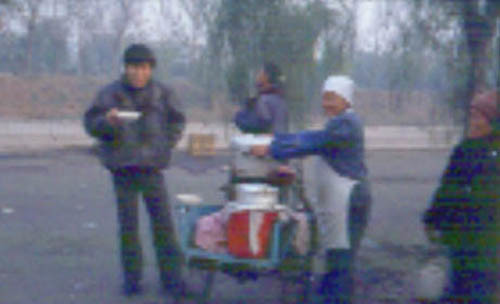
Running kitchen
6.10.1990
www.flickr.com/photos/jeanette
Five o’clock in the morning. We land. It’s dark. After sleepless hours I shiver in the cold and wet night. We’ll go to the bus stop at daybreak. In the large waiting room of the port, travelers, lying on benches, stay up and come near us. It’s a group of strange fellows with a silly air, dressed poorly but warmly: padded jackets and boots. They seem examine us like two extraterrestrial creatures. Hesitating hands touch our bags, our clothes…their comments are articulated slowly and gutturally. They don’t look aggressive. Perhaps we are the first Westerns they see!? We don’t say anything and don’t move. Here we have no chance to be informed about the bus and go outside. A lugubrious environment. A wide earthy place where walk some similar fellows like those inside. We go towards a dilapidated motor tricycle and his driver. We say “Huang Shan”; smiling he invites us to sit on his “self-made” trailer. It’s a non-sense we think – 180km - on this way! Time past, soon 7’oclock. Despaired we are because “no bus in the horizon”; then suddenly appears a lady dressed officially. No English but Milan draws a bus and the calligraphy of Huangshan. Now she writes “5km” between Huangshan and the bus! No more questions. We “jump” in the self-made taxi surrounded by a merry sympathetic company.
It’s very cold sitting in the open trailer; no matter we are too glad to feel it. At the bus station our driver help us to buy tickets. He looks very satisfied and vehement refuse to accept the pourboire (drink-money) we insist to favor him. I can’t believe it, infinitely helpful and dignified.
Our minibus, a ruin. Our seats are pretty good but the others are rather holes than seats! Windows: no glass. The bus is full as an egg but nobody looks angry or nervous. On the way when we stop some more succeed to enter with enormous baskets and other. It’s a circus! Under my seat I can hear a sweet gossiping duck. I wonder how our poor vehicle holds out on these abominable roads. The spectacle of the encumbered roads is fascinating. Sometimes we pass over a carpet of spike of corn, farther they sweep the grains away. Surprises on each corner! On this trip I have he opportunity to experience the traditional Chinese toilets. In a village we stop. I follow some women I suppose going to the toilets. Several of them enter together in a small edifice and entering myself I am in the company of these “ladies” squatted side by side above a channel doing what they have to do! Jeanette wanted to live like the common Chinese….here she does! Anyhow after this experience I don’t feel badly.
We arrive in the afternoon (130km. – 7 hours) at the base camp alt. 670m. A nice comfortable room at the Tao-Yuan Hotel (=Thermal Springs) is welcome. Indefatigable and impatient, we explore the neighborhoods from where will start the conquest of the famous mountain sang by so many poets since centuries and centuries.

Running kitchen
Mounts HUANGSHAN
8, 9, 10 October 1990
www.flickr.com/photos/jeanette
A ray of sunshine enter the room when we wakeup. We hurry to pack what we need to spend three days on the mountain, which may change mood in a trice. In order to spare energy we go by cable car up to Beihai (The North Sea) one of the 70 summits of Huang-shan (shan means mountain). The average of visitors is two thousand a day. Their dearest wish is to be close Buddha once in lifetime. Reaching at 1.630m. we run to book a room for the night. Surprise! No free bed. We have absolutely to stay we say. We literally implore everyone on the reception and get a pitiable hut which seems to be, at this moment, a hotel de luxe!
Now we may enjoy the spectacular landscape which surrounds us. Splendid peaks with thousand-year-old pines expand as far as my eyes can see. Stone ways and staircases access to many terraces from where we discover a new space. My hart will crack! Huangshan will be the bouquet of our walker’s excursions. It’s written this mountain attracts painters and poets for more than thousand years. Today I can see two inspirited artists painting those marvels. Before going in bed we explore the environment to locate an ideal look-out point to watch the rising sun.
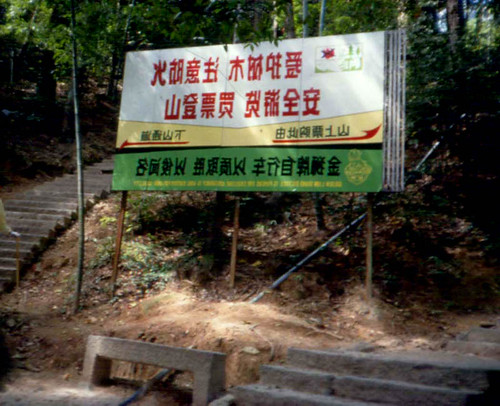
Information board
www.flickr.com/photos/jeanette
A ray of sunshine enter the room when we wakeup. We hurry to pack what we need to spend three days on the mountain, which may change mood in a trice. In order to spare energy we go by cable car up to Beihai (The North Sea) one of the 70 summits of Huang-shan (shan means mountain). The average of visitors is two thousand a day. Their dearest wish is to be close Buddha once in lifetime. Reaching at 1.630m. we run to book a room for the night. Surprise! No free bed. We have absolutely to stay we say. We literally implore everyone on the reception and get a pitiable hut which seems to be, at this moment, a hotel de luxe!
Now we may enjoy the spectacular landscape which surrounds us. Splendid peaks with thousand-year-old pines expand as far as my eyes can see. Stone ways and staircases access to many terraces from where we discover a new space. My hart will crack! Huangshan will be the bouquet of our walker’s excursions. It’s written this mountain attracts painters and poets for more than thousand years. Today I can see two inspirited artists painting those marvels. Before going in bed we explore the environment to locate an ideal look-out point to watch the rising sun.

Information board
The Rising Sun.
When our alarm clock rings, at 5 o’clock, we hear steps and voices outside. It’s time to put on the padded jackets we found in the room for the circumstance. Fascinating is Huangshan with its hundreds of phantoms, going up and down in the night, their lighted pocket-lamps looking like walking stars. Hand in hand we find the place we chose yesterday. Soon all the terraces are invaded; some of the spectators are wrapped in a plaid. Murmuring voices in the air make the atmosphere captivating. As minutes flow away the tension rises. Suddenly it’s a complete stillness when a pale light appears at the horizon and let guess the contours of the phantasmagoric forms of the peaks. Then, during about half an hour, it’s a gallery of the most beautiful sceneries I have ever seen. A memorial impression forever! Suddenly, at the moment the sun appears, a triumphal clamour burst out and a round of applause breaks the charm!
As at the end of a meeting, slowly the crowd is going away.
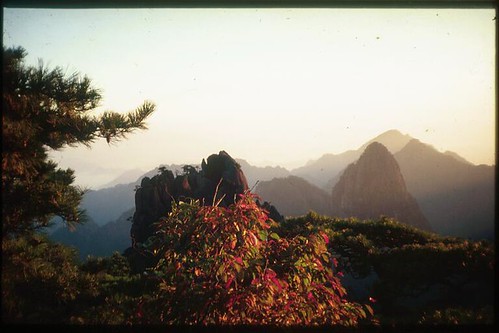
Sunrising
When our alarm clock rings, at 5 o’clock, we hear steps and voices outside. It’s time to put on the padded jackets we found in the room for the circumstance. Fascinating is Huangshan with its hundreds of phantoms, going up and down in the night, their lighted pocket-lamps looking like walking stars. Hand in hand we find the place we chose yesterday. Soon all the terraces are invaded; some of the spectators are wrapped in a plaid. Murmuring voices in the air make the atmosphere captivating. As minutes flow away the tension rises. Suddenly it’s a complete stillness when a pale light appears at the horizon and let guess the contours of the phantasmagoric forms of the peaks. Then, during about half an hour, it’s a gallery of the most beautiful sceneries I have ever seen. A memorial impression forever! Suddenly, at the moment the sun appears, a triumphal clamour burst out and a round of applause breaks the charm!
As at the end of a meeting, slowly the crowd is going away.

Sunrising
Going down.
Entering the immense restaurant of the hotel, no free places. A pleasant couple invites us at their table. Breakfast is not appetizing: fried peanuts, rice floating in liquid, brown beans, bread cooked on vapor, a biscuit. Even I don’t like it I swallow all of it because I need to be fit to face the 6.000 steps which will bring us back to our starting point.
Our backpacks are light. Here we are setting out on ways very different from OUR mountains paths. They are traced in the stone, the steps engraved in the rock. It’s a luminous day, the exceptional visibility let us see Huangshan in whole its greatness. Wonderful is the blend of enormous rocks of grotesque shape and luxuriant vegetation. Profile around us majestic peaks with millennial pines in multiple attitudes, which gave them picturesque names such as “Pine of the Black Tiger”, “Siamese twins”… Now I see a lonely pine tree growing on the top of a peak! On our going down we have to pass the top of “Lotus Flower” climbing abrupt endless staircases. I fear to look up; the top of the way seems to be lost in the sky. There is fortunately a slope, which helps me to mount. At the top I lose breath in front of the splendid view. Innumerable cliffs erect at the horizon. To go down of the Lotus Flower is not easier on those precipitous rocky staircases. When I succeed to overcome the most problematic spot I may, relaxed, admire the landscapes.
Suddenly, far away, I discern Yupinglu (Jade Screen in the Heaven), where we hope to spend the night. After a walk of six hours the sun is still high in the sky. Thank God! We get the last free room.
In front of the refuge (alt. 1.160m.) backed against the rock, extends a terrace which overhangs the spectacular scenery of a cliff sea, extraterrestrial shaped. The place is fairy-like. I enjoy intensively this moment I dreamed of. Now I realize why poets find inspiration to meditate on nature visiting the magic Huangshan .
In the evening we enjoy the sunset filtering through the millennial pine in front of the refuge. Its long branches, stretched to the visitors seem to say they are welcome. So they gave him the symbolic name: “Pine of Welcome”.
We are halfway of the descent, that’s why we live Yupinglu early in the morning when a sea of snow-white clouds encloses Yupinglu. Some peaks emerge, then disappear in clouds. Fantastic picture! Today, I enjoy more calm the surrounding where blend vales, peaks, abysses, forests…. On a steep staircase arrive porters overloaded with supplies to provide Yupinglu. I back against the rock to let them go in order not to interrupt their rhythm. I feel guilty, such a labour to satisfy others pleasure. I forget my compassion when steps are so steep I wouldn’t be able to go along without a parapet, which protects me from the abysses on my left. At some places therapeutists help the pilgrims to put their poor legs in order, if necessary.
About midday, tired but happy, we arrive at the end of one more unforgettable experience; in the afternoon we say adieu to Huangshan.
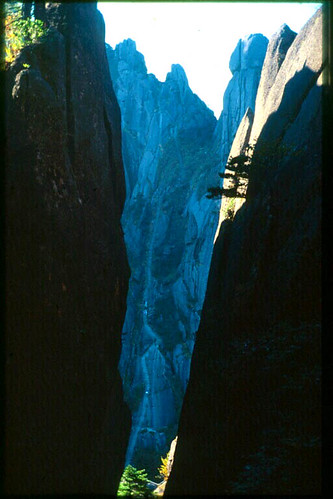
Up to Lotus Flower
Entering the immense restaurant of the hotel, no free places. A pleasant couple invites us at their table. Breakfast is not appetizing: fried peanuts, rice floating in liquid, brown beans, bread cooked on vapor, a biscuit. Even I don’t like it I swallow all of it because I need to be fit to face the 6.000 steps which will bring us back to our starting point.
Our backpacks are light. Here we are setting out on ways very different from OUR mountains paths. They are traced in the stone, the steps engraved in the rock. It’s a luminous day, the exceptional visibility let us see Huangshan in whole its greatness. Wonderful is the blend of enormous rocks of grotesque shape and luxuriant vegetation. Profile around us majestic peaks with millennial pines in multiple attitudes, which gave them picturesque names such as “Pine of the Black Tiger”, “Siamese twins”… Now I see a lonely pine tree growing on the top of a peak! On our going down we have to pass the top of “Lotus Flower” climbing abrupt endless staircases. I fear to look up; the top of the way seems to be lost in the sky. There is fortunately a slope, which helps me to mount. At the top I lose breath in front of the splendid view. Innumerable cliffs erect at the horizon. To go down of the Lotus Flower is not easier on those precipitous rocky staircases. When I succeed to overcome the most problematic spot I may, relaxed, admire the landscapes.
Suddenly, far away, I discern Yupinglu (Jade Screen in the Heaven), where we hope to spend the night. After a walk of six hours the sun is still high in the sky. Thank God! We get the last free room.
In front of the refuge (alt. 1.160m.) backed against the rock, extends a terrace which overhangs the spectacular scenery of a cliff sea, extraterrestrial shaped. The place is fairy-like. I enjoy intensively this moment I dreamed of. Now I realize why poets find inspiration to meditate on nature visiting the magic Huangshan .
In the evening we enjoy the sunset filtering through the millennial pine in front of the refuge. Its long branches, stretched to the visitors seem to say they are welcome. So they gave him the symbolic name: “Pine of Welcome”.
We are halfway of the descent, that’s why we live Yupinglu early in the morning when a sea of snow-white clouds encloses Yupinglu. Some peaks emerge, then disappear in clouds. Fantastic picture! Today, I enjoy more calm the surrounding where blend vales, peaks, abysses, forests…. On a steep staircase arrive porters overloaded with supplies to provide Yupinglu. I back against the rock to let them go in order not to interrupt their rhythm. I feel guilty, such a labour to satisfy others pleasure. I forget my compassion when steps are so steep I wouldn’t be able to go along without a parapet, which protects me from the abysses on my left. At some places therapeutists help the pilgrims to put their poor legs in order, if necessary.
About midday, tired but happy, we arrive at the end of one more unforgettable experience; in the afternoon we say adieu to Huangshan.

Up to Lotus Flower
HANGZHOU
The Lake Xi hu
11, 12, 13 October 1990
www.flickr.com/photos/jeanette
We leave the Mounts Huangshan like we came, by minibus. This time it’s a comfortable up to date Ivecco which will bring us to Hangzhou – 280 km – in the direction of Shanghai. Wide rice plantations along the road, green or yellow according to their ripeness; from time to time somewhere a pagoda. I ignore the landscape; I am still on the ways between sky and earth!
We enter Hangzhou seven hours later. We settle down in an ancient Mandarin’s residence, turned into a hotel located at the border of the lake Xi-hu (Lake of the West), which makes the fame of the place. Our diagram of expenses does not allow luxury, so we satisfy with a cheap room and common showers.
Tired because the 6.000 steps and the journey we go to bed early. Strange noises seem to come from the floor. Milan discovers holes in it and a company of mice! He tries to stop the “exits” with paper. Soon, hearing a nibbling, I definitively decide to leave the room. At the reception nobody speaks English (it’s the only strange language used in the country). No effective is my “MICE IN THE ROOM”! nor the sketch of a mouse. We have to be calm because the Chinese never shows animosity. We are patient and finally we get a room without mice ………but without windows too!
Hangzhou is an ancient imperial capital which Marco Polo (XIIIe s.) did the honors of in his manuscript “Livre des Merveilles”. Nothing remains the fasts of the site where emperors and notables preferred to stay; no matter coming here to rest, the most of time we spend near the lake Xi-hu surrounded by timbered hills with their temples, fountains and springs. At Longjing (Dragon Well) Spring we buy the well-known Longjing tea. Sometimes exploring its small islands we plunge in the mystical atmosphere of their temples.
Cookery is excellent and cheap. We enjoy the fantastic choice of fish dishes and fine cakes we didn’t see until now. Throughout the 28 past days we found everywhere all sorts of fruit we know but also exotics species like very sweet lychees and others we had never seen on our markets.
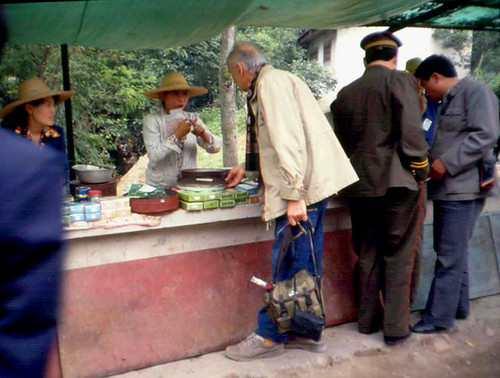
Tea shop
11, 12, 13 October 1990
www.flickr.com/photos/jeanette
We leave the Mounts Huangshan like we came, by minibus. This time it’s a comfortable up to date Ivecco which will bring us to Hangzhou – 280 km – in the direction of Shanghai. Wide rice plantations along the road, green or yellow according to their ripeness; from time to time somewhere a pagoda. I ignore the landscape; I am still on the ways between sky and earth!
We enter Hangzhou seven hours later. We settle down in an ancient Mandarin’s residence, turned into a hotel located at the border of the lake Xi-hu (Lake of the West), which makes the fame of the place. Our diagram of expenses does not allow luxury, so we satisfy with a cheap room and common showers.
Tired because the 6.000 steps and the journey we go to bed early. Strange noises seem to come from the floor. Milan discovers holes in it and a company of mice! He tries to stop the “exits” with paper. Soon, hearing a nibbling, I definitively decide to leave the room. At the reception nobody speaks English (it’s the only strange language used in the country). No effective is my “MICE IN THE ROOM”! nor the sketch of a mouse. We have to be calm because the Chinese never shows animosity. We are patient and finally we get a room without mice ………but without windows too!
Hangzhou is an ancient imperial capital which Marco Polo (XIIIe s.) did the honors of in his manuscript “Livre des Merveilles”. Nothing remains the fasts of the site where emperors and notables preferred to stay; no matter coming here to rest, the most of time we spend near the lake Xi-hu surrounded by timbered hills with their temples, fountains and springs. At Longjing (Dragon Well) Spring we buy the well-known Longjing tea. Sometimes exploring its small islands we plunge in the mystical atmosphere of their temples.
Cookery is excellent and cheap. We enjoy the fantastic choice of fish dishes and fine cakes we didn’t see until now. Throughout the 28 past days we found everywhere all sorts of fruit we know but also exotics species like very sweet lychees and others we had never seen on our markets.

Tea shop
GRAND CANAL
An authentic sailing
14 October 1990.
www.flickr.com/photos/jeanette
Three days on the lake restored us to fitness. So we engage a pedicab to go to the Grand Canal from where we’ll go to Suzhou (200km.). Comfortably sitting behind the driver I feel compassion seeing him to pedal so hardly and we decide to pay more than his price. Surprised, we can’t believe hearing: “Change the money” showing a bundle of yuan! To say truth, till now, we have changed our dollars on the street, in boutiques, just because they ask for everywhere we go on. So we get Renminbi or “People’s Money”. It’s very profitable for our daily expenses. The hotels and trains we have to pay in FEC (Foreign Exchange Certificates). We take them in the banks or exchange offices.
At midday we arrive at the Grand Canal, construction as imposing as the Great Wall. In the year 604 they started to build it and since 1300 it has its actual aspect connecting Peking to Hangzhou (1.800 km.) its Southern end. The environment is far to be idyllic. A total contrast with the luminosity of the lake we just left. The atmosphere associates the districts and their populace described by Ch. Dickens. I feel to be back in the time of Qianghong Emperor when horses walking on the strike drew the boats. Nothing seems to be changed except the engines replace the animals. Our cabin without comfort and hygiene make the scene absolutely authentic!
The leaving evolution of the ship is extremely complicated because the narrowness of the channel. Our ship tows four others. The convoy transports travelers of any conditions but the majority with enormous baskets full of vegetables is on their way to the markets. The traffic on the channel is captivating. I look fascinated at the continuous stir of the barges charged with cool, bricks, stones, bars of iron. They compete with immense rafts charged with bamboos.
Traffic functions surprising well even at the narrowest places. Our convoy is very length what limits its fleetness. Moreover, the barges slip swiftly; some outrun us. No stagnations, as if invisible semaphores lights to regulate the traffic. I can see on the barges passing near me, a family life – parents, children and a dog. On one end the man hold the helm, on the other end the woman commands. With a long bamboos stem she vigorously pushes against the obstacles to avoid a collision. Extraordinary is the dexterity of the pilots when they arrive at “crossroads” where the rhythm doesn’t slacken, quite the contrary, sometimes stimulated by outcries to avoid the worst. A whole system supplies the Grand Canal. Those numerous crossroads are the places where lateral channels are drown in ours.
It’s getting dark. A dense fog covers the surroundings. The traffic continues. Very exciting is this experience when the deep sound of our convoy’s siren resounds in the night. Then our captain launches, using a microphone, messages which reflect far on the channel I suppose to prevent the others of the importance of his convoy. Now we progress very slowly. Over there, in the obscurity, I hear other sirens announcing their presence too. I would like to stay in this phantomic environment but I must rest.
In the middle of the night a shake and noises of broken panes wake us. I hurry to see what happens; opening the door of our cabin, an enormous “construction” grazes our ship. Thank Goodness, nothing serious; only some broken panes on the lower part. I return to bed hoping to arrive safe and sound in order that we may go to the conquest of Suzhou.
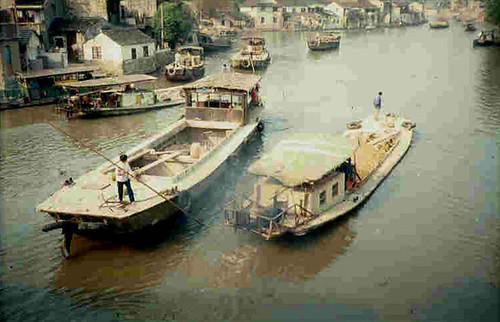
She avoids a collision
14 October 1990.
www.flickr.com/photos/jeanette
Three days on the lake restored us to fitness. So we engage a pedicab to go to the Grand Canal from where we’ll go to Suzhou (200km.). Comfortably sitting behind the driver I feel compassion seeing him to pedal so hardly and we decide to pay more than his price. Surprised, we can’t believe hearing: “Change the money” showing a bundle of yuan! To say truth, till now, we have changed our dollars on the street, in boutiques, just because they ask for everywhere we go on. So we get Renminbi or “People’s Money”. It’s very profitable for our daily expenses. The hotels and trains we have to pay in FEC (Foreign Exchange Certificates). We take them in the banks or exchange offices.
At midday we arrive at the Grand Canal, construction as imposing as the Great Wall. In the year 604 they started to build it and since 1300 it has its actual aspect connecting Peking to Hangzhou (1.800 km.) its Southern end. The environment is far to be idyllic. A total contrast with the luminosity of the lake we just left. The atmosphere associates the districts and their populace described by Ch. Dickens. I feel to be back in the time of Qianghong Emperor when horses walking on the strike drew the boats. Nothing seems to be changed except the engines replace the animals. Our cabin without comfort and hygiene make the scene absolutely authentic!
The leaving evolution of the ship is extremely complicated because the narrowness of the channel. Our ship tows four others. The convoy transports travelers of any conditions but the majority with enormous baskets full of vegetables is on their way to the markets. The traffic on the channel is captivating. I look fascinated at the continuous stir of the barges charged with cool, bricks, stones, bars of iron. They compete with immense rafts charged with bamboos.
Traffic functions surprising well even at the narrowest places. Our convoy is very length what limits its fleetness. Moreover, the barges slip swiftly; some outrun us. No stagnations, as if invisible semaphores lights to regulate the traffic. I can see on the barges passing near me, a family life – parents, children and a dog. On one end the man hold the helm, on the other end the woman commands. With a long bamboos stem she vigorously pushes against the obstacles to avoid a collision. Extraordinary is the dexterity of the pilots when they arrive at “crossroads” where the rhythm doesn’t slacken, quite the contrary, sometimes stimulated by outcries to avoid the worst. A whole system supplies the Grand Canal. Those numerous crossroads are the places where lateral channels are drown in ours.
It’s getting dark. A dense fog covers the surroundings. The traffic continues. Very exciting is this experience when the deep sound of our convoy’s siren resounds in the night. Then our captain launches, using a microphone, messages which reflect far on the channel I suppose to prevent the others of the importance of his convoy. Now we progress very slowly. Over there, in the obscurity, I hear other sirens announcing their presence too. I would like to stay in this phantomic environment but I must rest.
In the middle of the night a shake and noises of broken panes wake us. I hurry to see what happens; opening the door of our cabin, an enormous “construction” grazes our ship. Thank Goodness, nothing serious; only some broken panes on the lower part. I return to bed hoping to arrive safe and sound in order that we may go to the conquest of Suzhou.

She avoids a collision
SUZHOU
The Gardens
15, 16, 17, 18 October 1990
www.flickr.com/photos/jeanette
At 10 AM we arrive in Suzhou, 80 km. West of Shanghai. The hotels, which suit with our budget, don’t have free double rooms. Giving our search up we decide to stay at Friendship Hotel. It costs 20 $ per night. It’s one of the favorite places of notables and businessmen. Ladies dressed in the traditional Chinese long tunic made of pure silk lounge there. For my part any complex in spite of our look after a 29 days voyage, sometimes in primitive conditions. A smiling groom takes us to a lovely room with a “delicious” bathroom we need more than ever!
Suzhou was the capital of king Wu in 518 B.C. Since the sinking if the Grand Canal (603) it became an important shopping center where the weaving of silk (it was born here) occupies, and still now, the first place in the country. Its microclimate, its rich cultural traditions and its extraordinary gardens designed during Qing dynasty (1644 – 1911) made of it a first class vacation resort. I like Suzhou from my first steps in the shade of the enormous plane trees on its wide avenues. Firstly we visit the smallest garden named Master of the Nets (fisherman). It’s a charming environment typically Chinese. A pond with nenuphars, rocks in recreated landscapes, here and there kiosks and pavilions in original styles. We wander in these queer surroundings until nightfall.
“Plain Man’s Politics Garden”! At the entrance I read an ancient quotation, which inspired its creator: “To cultivate one’s garden to meet one’s daily needs, that’s what is known as the politics of the plain man”. The day is to short to discover the immense park magnificently imagined we have the opportunity to see in a beautiful autumnal ornament. Artificial hills, lakes, small islands, zigzag bridges, palates, temples, bonsai, bamboos, chrysanthemums in blossom…a spectacle!
Here more than elsewhere this mysterious China intrigues me: the symbolic names of their gardens, enigmatic inscriptions engraved in the stones, its specific architecture, the reaction of the visitors, which reflects the passionate relations between the Chinese and these vestiges, witness of their past.
The third day starts with the purchase of train tickets for Shanghai. At the booking office some Mister Wu Yong Ming wants to help us. We accept with pleasure. Getting the tickets we hear he is a young professor in electronics at the University of Shanghai and vice-president of an institute. He proposes to go with us to Lin Garden - 7km. away, a space of 3ha. May be the Providence sent us this improvised guide to clear up some enigmas of the Chinese garden’s elements absolutely incomprehensible to us. Indeed, walking in a milieu like yesterday Mr. Wu tell us that the gardens of Suzhou built for mandarins, politicians, literati…were designed by architects, painters and poets. They represent the lyricism and romanticism, which incite meditation.
Here are some of his comments.
The kiosk “Breeze and the Moon” mirrored in a pond: It reminds the rendez vous’ of yore and appears to be the ideal place to contemplate the reflex of the moon in the water!
A kiosk with four round doors surrounded with bamboos, Lotus Flowers and willows is called “Refuge in the Bamboos shade. Inside a calligraphic quotation: “We benefit the freshness of the breeze and the moonlight”
An other one called “The Pavilion where we stop to listen the rain”! Its name springs from an ancient poetry more than 1200 years ago, which express the melancholy sound of he droplets falling on the dried lotus leaves.
Our friend would still have many to say but he must go to a conference. He will stay engraved in our memory because his greatness of soul, dignity and modesty.
At sun setting we wander along the channels, which make the fame of Suzhou too. Moreover, Marco Polo baptized Suzhou “Venice of the East”.
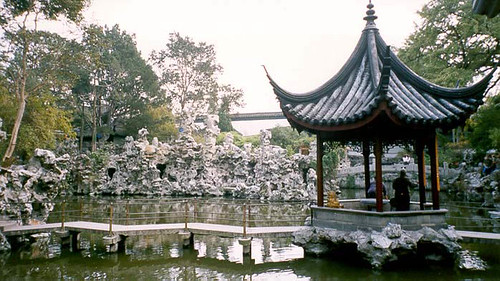
Lin Garden
15, 16, 17, 18 October 1990
www.flickr.com/photos/jeanette
At 10 AM we arrive in Suzhou, 80 km. West of Shanghai. The hotels, which suit with our budget, don’t have free double rooms. Giving our search up we decide to stay at Friendship Hotel. It costs 20 $ per night. It’s one of the favorite places of notables and businessmen. Ladies dressed in the traditional Chinese long tunic made of pure silk lounge there. For my part any complex in spite of our look after a 29 days voyage, sometimes in primitive conditions. A smiling groom takes us to a lovely room with a “delicious” bathroom we need more than ever!
Suzhou was the capital of king Wu in 518 B.C. Since the sinking if the Grand Canal (603) it became an important shopping center where the weaving of silk (it was born here) occupies, and still now, the first place in the country. Its microclimate, its rich cultural traditions and its extraordinary gardens designed during Qing dynasty (1644 – 1911) made of it a first class vacation resort. I like Suzhou from my first steps in the shade of the enormous plane trees on its wide avenues. Firstly we visit the smallest garden named Master of the Nets (fisherman). It’s a charming environment typically Chinese. A pond with nenuphars, rocks in recreated landscapes, here and there kiosks and pavilions in original styles. We wander in these queer surroundings until nightfall.
“Plain Man’s Politics Garden”! At the entrance I read an ancient quotation, which inspired its creator: “To cultivate one’s garden to meet one’s daily needs, that’s what is known as the politics of the plain man”. The day is to short to discover the immense park magnificently imagined we have the opportunity to see in a beautiful autumnal ornament. Artificial hills, lakes, small islands, zigzag bridges, palates, temples, bonsai, bamboos, chrysanthemums in blossom…a spectacle!
Here more than elsewhere this mysterious China intrigues me: the symbolic names of their gardens, enigmatic inscriptions engraved in the stones, its specific architecture, the reaction of the visitors, which reflects the passionate relations between the Chinese and these vestiges, witness of their past.
The third day starts with the purchase of train tickets for Shanghai. At the booking office some Mister Wu Yong Ming wants to help us. We accept with pleasure. Getting the tickets we hear he is a young professor in electronics at the University of Shanghai and vice-president of an institute. He proposes to go with us to Lin Garden - 7km. away, a space of 3ha. May be the Providence sent us this improvised guide to clear up some enigmas of the Chinese garden’s elements absolutely incomprehensible to us. Indeed, walking in a milieu like yesterday Mr. Wu tell us that the gardens of Suzhou built for mandarins, politicians, literati…were designed by architects, painters and poets. They represent the lyricism and romanticism, which incite meditation.
Here are some of his comments.
The kiosk “Breeze and the Moon” mirrored in a pond: It reminds the rendez vous’ of yore and appears to be the ideal place to contemplate the reflex of the moon in the water!
A kiosk with four round doors surrounded with bamboos, Lotus Flowers and willows is called “Refuge in the Bamboos shade. Inside a calligraphic quotation: “We benefit the freshness of the breeze and the moonlight”
An other one called “The Pavilion where we stop to listen the rain”! Its name springs from an ancient poetry more than 1200 years ago, which express the melancholy sound of he droplets falling on the dried lotus leaves.
Our friend would still have many to say but he must go to a conference. He will stay engraved in our memory because his greatness of soul, dignity and modesty.
At sun setting we wander along the channels, which make the fame of Suzhou too. Moreover, Marco Polo baptized Suzhou “Venice of the East”.

Lin Garden
SHANGHAI
19 – 24 October 1990
www.flickr.com/photos/jeanette
Sitting in a comfortable ventilated fast train, we travel to Shanghai, 80 km west of Suzhou. No doubt we approach a high economic and cultural city regarding the look of the travelers. Arrived in the most populated town of China, thirteen million of inhabitants, we examine our map in order to locate “Pujiang Hotel” LP proposed. At once a certain Mr. Huang offers to show the way and go with us. This cordial gesture is welcome because we feared to face this gigantic unknown city.
Got rid of our bags, we hurry to Peace Hotel where we hope to find a counter (so says LP) where are held incoming letters addressed c/o Peace Hotel. Indeed! Here we get news from home the first time since we are in China. We feel quite well now and gaily go to the Bund, an Anglo-Indian term meaning the quay. We are on the bank of the Huang Pu River where still now exist the towers, symbol of the foreign concessions.
In 1843 an English consul settled in Shanghai. He was the first white who penetrated into that city. He made of it the center of opium production. Then Shanghai became the center of manufacturers and financiers.
I don’t like the Bund because its Western look, so we enter Nanjing lu (Nanjing street), the broadest and longest (5km) of the town. Standing on one of the numerous footbridges fascinating is the look of the crowd as far as we can see. From here, Shanghai seems really to be the densest place in the country. Daily an average of a million people move through this street they say. A very lively atmosphere here on the pavement where settled different trade companies. Interesting is the animation around the benches where are working carpenters, shoemakers, tailors, clockmakers, hairdressers, barbers, grinders….There is also a medical service. Here we control our arterial tension. Impossible to make out the results however the smiling faces seem to say we are fit to continue our voyage.
On Nanjing lu everything can be found. Here we do our first shopping: blouses – shirts – pyjamas in pure silk at incredibly low prices. It’s not easy to communicate but we are served with the same spontaneous kindness like so far.
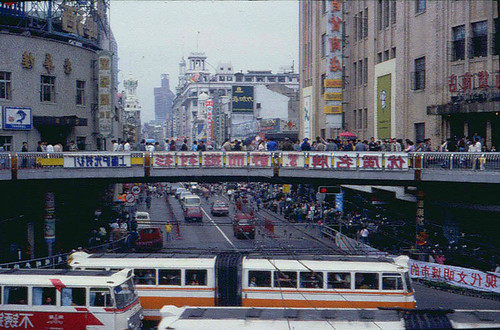
Nanjing lu
www.flickr.com/photos/jeanette
Sitting in a comfortable ventilated fast train, we travel to Shanghai, 80 km west of Suzhou. No doubt we approach a high economic and cultural city regarding the look of the travelers. Arrived in the most populated town of China, thirteen million of inhabitants, we examine our map in order to locate “Pujiang Hotel” LP proposed. At once a certain Mr. Huang offers to show the way and go with us. This cordial gesture is welcome because we feared to face this gigantic unknown city.
Got rid of our bags, we hurry to Peace Hotel where we hope to find a counter (so says LP) where are held incoming letters addressed c/o Peace Hotel. Indeed! Here we get news from home the first time since we are in China. We feel quite well now and gaily go to the Bund, an Anglo-Indian term meaning the quay. We are on the bank of the Huang Pu River where still now exist the towers, symbol of the foreign concessions.
In 1843 an English consul settled in Shanghai. He was the first white who penetrated into that city. He made of it the center of opium production. Then Shanghai became the center of manufacturers and financiers.
I don’t like the Bund because its Western look, so we enter Nanjing lu (Nanjing street), the broadest and longest (5km) of the town. Standing on one of the numerous footbridges fascinating is the look of the crowd as far as we can see. From here, Shanghai seems really to be the densest place in the country. Daily an average of a million people move through this street they say. A very lively atmosphere here on the pavement where settled different trade companies. Interesting is the animation around the benches where are working carpenters, shoemakers, tailors, clockmakers, hairdressers, barbers, grinders….There is also a medical service. Here we control our arterial tension. Impossible to make out the results however the smiling faces seem to say we are fit to continue our voyage.
On Nanjing lu everything can be found. Here we do our first shopping: blouses – shirts – pyjamas in pure silk at incredibly low prices. It’s not easy to communicate but we are served with the same spontaneous kindness like so far.

Nanjing lu
The old city
During the next days we go discovering the old traditional city that’s why, here we are early in the morning. In this district we can notice the evidence of the extremely density still more than on Nanjing lu. In very narrow lanes, just enough space to go side-by-side, style of life is especially attractive. I feel a little indiscreet passing near people brushing their teeth, washing their hair (on the street) though they don’t mind it seems. I remember the toilets exempt of partitions on the road to Huangshan; so it’s obvious they don’t have the problem of promiscuity. I would like to know is it the result of the narrowness of the habitats or the mentality of this people. To difficult question for Westerns! On the pavement stoves smoke, washing machines work, women prepare vegetables merchants bring in baskets on their shoulders. Now we walk under wash hanging between wooden houses. Around us only ease and smiling faces. Being back home I’m sure I’ll think well of our way of living and exigencies to feel happy.
Yu Yuan, a charming garden created for Mandarin Yu five centuries ago. Crossing a zigzag bridge we enter a pavilion adapted into a cha-dian (tea house). The enigma of the zigzag bridges is finally solved: the devil going exclusively straight cannot cross it.
On the floor a typical ambient. Around little tables young people very nice looking enjoy their tea in the usual miniature cups. We enjoy the pleasant place and jasmine tea. Like in Chengdu, a hostess walk around with hot water filling the empty cups. I like the look of the tender girls dressed in black pants and pink blouses delicately embroided; others wear mohair sweaters adorn with little white pearls. A very relaxed and discrete company. The scenery harmonizes with traditional ancient melodies three old Chinese are playing on strange string instruments. Unforgettable moments!
In the old city we join an interested group looking at the players of xiangqi; it’s a sort of chess where tanks, horses, guns, solders and generals are confronted. The actors sitting on low stools are absolutely concentrated ignoring the spectators.
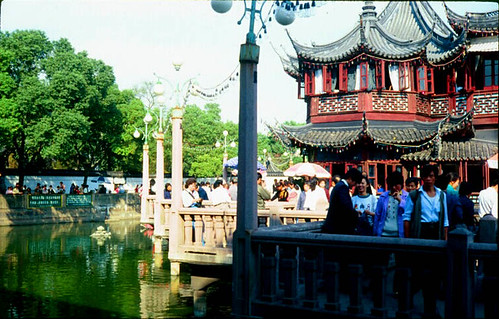
Tea house Yu Yuan
During the next days we go discovering the old traditional city that’s why, here we are early in the morning. In this district we can notice the evidence of the extremely density still more than on Nanjing lu. In very narrow lanes, just enough space to go side-by-side, style of life is especially attractive. I feel a little indiscreet passing near people brushing their teeth, washing their hair (on the street) though they don’t mind it seems. I remember the toilets exempt of partitions on the road to Huangshan; so it’s obvious they don’t have the problem of promiscuity. I would like to know is it the result of the narrowness of the habitats or the mentality of this people. To difficult question for Westerns! On the pavement stoves smoke, washing machines work, women prepare vegetables merchants bring in baskets on their shoulders. Now we walk under wash hanging between wooden houses. Around us only ease and smiling faces. Being back home I’m sure I’ll think well of our way of living and exigencies to feel happy.
Yu Yuan, a charming garden created for Mandarin Yu five centuries ago. Crossing a zigzag bridge we enter a pavilion adapted into a cha-dian (tea house). The enigma of the zigzag bridges is finally solved: the devil going exclusively straight cannot cross it.
On the floor a typical ambient. Around little tables young people very nice looking enjoy their tea in the usual miniature cups. We enjoy the pleasant place and jasmine tea. Like in Chengdu, a hostess walk around with hot water filling the empty cups. I like the look of the tender girls dressed in black pants and pink blouses delicately embroided; others wear mohair sweaters adorn with little white pearls. A very relaxed and discrete company. The scenery harmonizes with traditional ancient melodies three old Chinese are playing on strange string instruments. Unforgettable moments!
In the old city we join an interested group looking at the players of xiangqi; it’s a sort of chess where tanks, horses, guns, solders and generals are confronted. The actors sitting on low stools are absolutely concentrated ignoring the spectators.

Tea house Yu Yuan
The last days
On the Bund, early in the morning, the spectacle of Chinese (the most old ones) practicing the tai-chi is of a striking beauty. A spectator tells us the tai-chi consists in connecting one’s breath to the breath of the Universe and takes care of the body via the spirit. The connected movements aim at a control of energy in oneself.
In Shanghai we taste the best raviolis whose varieties are numerous. Fried noodles and steamed rolls are my favorites too. The prices are unmeaning, that’s why the popular restaurants are always crowded.
Our last day fly away floating on the Huangpu River to the mouth of Yangtze River. We paid the excursion six yuan. The travel agency required twenty of them!
The sun is shining above Shanghai like everywhere we have been except a rainy day in Xian and another one in Chongqing. Leaving the port, from the upper deck we discover a remarkable view of the Bund. The port being one of the largest in the world, impressive are the images of transoceanic ships, giant cranes, forklifts etc. On the junction with the Yangtze River I have the opportunity to say an ultimate adieu…..
In the evening we take the train to Peking.
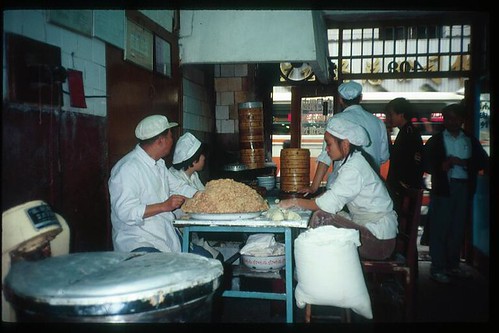
Ravioli masters
On the Bund, early in the morning, the spectacle of Chinese (the most old ones) practicing the tai-chi is of a striking beauty. A spectator tells us the tai-chi consists in connecting one’s breath to the breath of the Universe and takes care of the body via the spirit. The connected movements aim at a control of energy in oneself.
In Shanghai we taste the best raviolis whose varieties are numerous. Fried noodles and steamed rolls are my favorites too. The prices are unmeaning, that’s why the popular restaurants are always crowded.
Our last day fly away floating on the Huangpu River to the mouth of Yangtze River. We paid the excursion six yuan. The travel agency required twenty of them!
The sun is shining above Shanghai like everywhere we have been except a rainy day in Xian and another one in Chongqing. Leaving the port, from the upper deck we discover a remarkable view of the Bund. The port being one of the largest in the world, impressive are the images of transoceanic ships, giant cranes, forklifts etc. On the junction with the Yangtze River I have the opportunity to say an ultimate adieu…..
In the evening we take the train to Peking.

Ravioli masters
PEKING
25 October – 6 November 1990
www.flickr.com/photos/jeanette
A very comfortable voyage in a hard sleeper carriage. We are in company with Suzan (English) and Steve (Canadian). They arrived in Shanghai by boat from Hong Kong, visited Huangshan where they lost taking a wrong road at a crossing point. It was very foggy they say. Trembling along of coldness and fright they came out a village. It took them two days to reach Shanghai. We listen carefully their adventures; so they do hearing ours. Time pasts so fast we don’t believe we are at the end of the 1.462 km journey.
Ten days are left to visit Peking and its surroundings. No problem to take the bus to Ciao Yuan Hotel the one we stayed at 37 days ago arriving from Belgrade. A free room in the new building is a present!
On the top of our list “to see” is the Imperial Palace called Forbidden City because it was off-limits for 500 years. Passing the Supreme Harmony Gate I feel something like entering in a taboo world. Hardly sixty years ago the admission price was the instant death. We are in an immense courtyard where raise great halls which were used for imperial ceremonies. Looking around I think I know the place…a music recurs to my mind…it’s the theme of “The Last Emperor”! I remove at the time when the Tsars reigned protected from the common people...
We move between imposing halls, marvelous marble bridges, bronze incense burners, the large bronze turtle symbol of longevity and yet many strange relics of the Ming and Qing dynasties.
Here like in Suzhou denominations are particularly enigmatic and sound admirably.
Some of them: Hall of Supreme Harmony - Hall of Preserving Harmony - Palace of Heavenly Purity - Palace of Earthly Tranquility - Palace of Peaceful Old Age - Palace of Eternal Spring……..
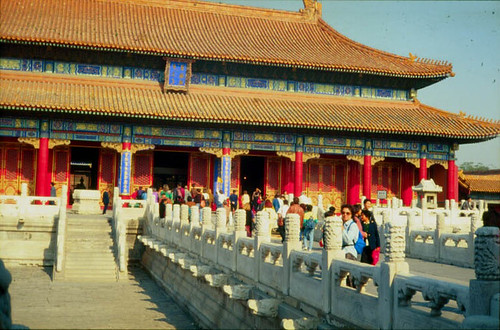
Hall of Supreme Harmony
www.flickr.com/photos/jeanette
A very comfortable voyage in a hard sleeper carriage. We are in company with Suzan (English) and Steve (Canadian). They arrived in Shanghai by boat from Hong Kong, visited Huangshan where they lost taking a wrong road at a crossing point. It was very foggy they say. Trembling along of coldness and fright they came out a village. It took them two days to reach Shanghai. We listen carefully their adventures; so they do hearing ours. Time pasts so fast we don’t believe we are at the end of the 1.462 km journey.
Ten days are left to visit Peking and its surroundings. No problem to take the bus to Ciao Yuan Hotel the one we stayed at 37 days ago arriving from Belgrade. A free room in the new building is a present!
On the top of our list “to see” is the Imperial Palace called Forbidden City because it was off-limits for 500 years. Passing the Supreme Harmony Gate I feel something like entering in a taboo world. Hardly sixty years ago the admission price was the instant death. We are in an immense courtyard where raise great halls which were used for imperial ceremonies. Looking around I think I know the place…a music recurs to my mind…it’s the theme of “The Last Emperor”! I remove at the time when the Tsars reigned protected from the common people...
We move between imposing halls, marvelous marble bridges, bronze incense burners, the large bronze turtle symbol of longevity and yet many strange relics of the Ming and Qing dynasties.
Here like in Suzhou denominations are particularly enigmatic and sound admirably.
Some of them: Hall of Supreme Harmony - Hall of Preserving Harmony - Palace of Heavenly Purity - Palace of Earthly Tranquility - Palace of Peaceful Old Age - Palace of Eternal Spring……..

Hall of Supreme Harmony
Lama Temple
Though we saw numerous temples till now we have to visit the Lama Temple, the most renowned Tibetan Buddhist temple in China built in 1694. We explore its beautiful gardens, stunning frescoes, tapestries, and carpentry. I feel so well among the Mongol monks, hearing the sound of little bells and gongs. The smoke emanating from the yak-butter lamps transports me for a while to Tibet.
Here we meet again Suzan and Steve, moved just like we are. Our latest experiences related, we go on continuing our pilgrimage.
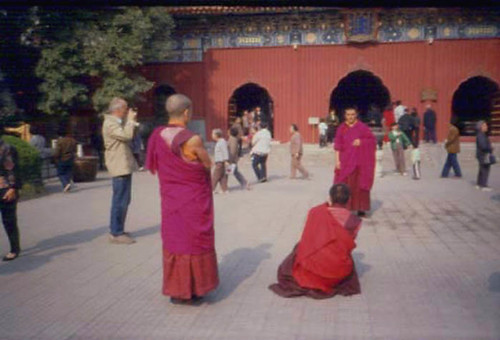
Tibetan Buddhist monks
Though we saw numerous temples till now we have to visit the Lama Temple, the most renowned Tibetan Buddhist temple in China built in 1694. We explore its beautiful gardens, stunning frescoes, tapestries, and carpentry. I feel so well among the Mongol monks, hearing the sound of little bells and gongs. The smoke emanating from the yak-butter lamps transports me for a while to Tibet.
Here we meet again Suzan and Steve, moved just like we are. Our latest experiences related, we go on continuing our pilgrimage.

Tibetan Buddhist monks
On the Street and Cooking
Peking is not only a city-temple, a city-palace, not at all. We even prefer to wander up and down the streets among the common people. We note there are neither beggars, neither tramps, neither drunkards, nor rubbish however here live a ten million of inhabitants and daily 250.000 Chinese tourists visit the town.
Small run kitchens on the street attract me particularly. I have to taste all their specialties. The corn-wafers with sesame seeds are delicious; candied fruit perched on sticks too, fritters…and other Chinese knick-knacks. We usually have dinner at a snack where lines of people are waiting to buy tickets. Sometimes hesitating what to order they take us to the kitchen where simply we have to point out the dishes we want.
Taste the Peking duck is a particular story. They serve it up in specialized restaurants. We stay in a row and pay 50 Yuan (about 10$) for both of us. Dinner begins when no more free place. We sit in the company of ten Chinese tourists around one of the numerous turning-tables. Nothing to order, it will be the same for everybody. It begins with cold appetizers: cold liver with very small boiled corn, fine sliced roasted duck meat, crispy skin wrapped in thin pancakes; follow hot appetizers: black mushrooms, bamboo’s shoots in plum sauce, salad made of cucumber peel, two hot sauces and then a half (or whole) warm duck roasted over a fruitwood fire. It’s really delicious. A duck soup is served at the end “to wash the food down”!
The Mongolian hotpot is also one of our favorites. In a brass pot on the table we cook strips of lamb meat and vegetables just like the fondue fashion. We have the opportunity to experience it in a numerous young company what’s very amusing.
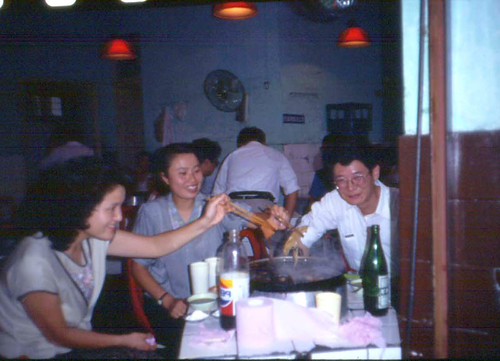
Mongolian hot pot
Peking is not only a city-temple, a city-palace, not at all. We even prefer to wander up and down the streets among the common people. We note there are neither beggars, neither tramps, neither drunkards, nor rubbish however here live a ten million of inhabitants and daily 250.000 Chinese tourists visit the town.
Small run kitchens on the street attract me particularly. I have to taste all their specialties. The corn-wafers with sesame seeds are delicious; candied fruit perched on sticks too, fritters…and other Chinese knick-knacks. We usually have dinner at a snack where lines of people are waiting to buy tickets. Sometimes hesitating what to order they take us to the kitchen where simply we have to point out the dishes we want.
Taste the Peking duck is a particular story. They serve it up in specialized restaurants. We stay in a row and pay 50 Yuan (about 10$) for both of us. Dinner begins when no more free place. We sit in the company of ten Chinese tourists around one of the numerous turning-tables. Nothing to order, it will be the same for everybody. It begins with cold appetizers: cold liver with very small boiled corn, fine sliced roasted duck meat, crispy skin wrapped in thin pancakes; follow hot appetizers: black mushrooms, bamboo’s shoots in plum sauce, salad made of cucumber peel, two hot sauces and then a half (or whole) warm duck roasted over a fruitwood fire. It’s really delicious. A duck soup is served at the end “to wash the food down”!
The Mongolian hotpot is also one of our favorites. In a brass pot on the table we cook strips of lamb meat and vegetables just like the fondue fashion. We have the opportunity to experience it in a numerous young company what’s very amusing.

Mongolian hot pot
The Great Wall
The last days are coming. It’s time to visit “Wan Li Chang Chen” which we know as “The Great Wall”. Great indeed since it’s 10.000 li (5000 km) long. A bus takes us to Badaling, 70 km northwest of Peking, crossing a campaign cultivated with vegetables, cereals, rice…no industries. Excitation begins when at the horizon appears something like a stone lace between the mounts Badaling.
Here we are, walking along that famous construction I have seen so many times on pictures and TV having no idea I’ll be there some day! It’s a lovely sunny day to admire the work which started at the second century BC when reigned Emperor Qin Shi Huangdi whose army we visited in Xian. Impressing is the surrounding seeing the wall stretching like a dragon among the mountains which extend far away; some peaks reach 1000 m. Proud we are leaving the symbol of Zhongguo (China) what means “The Center of the World”, the last but one trophy of our adventure.
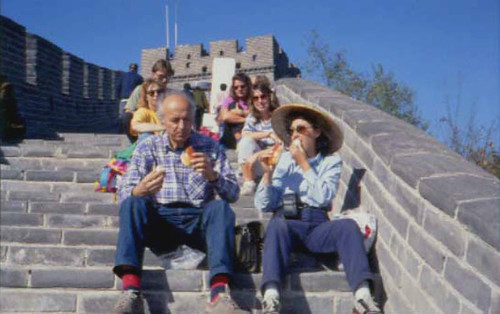
Picnic on The Wall
The last days are coming. It’s time to visit “Wan Li Chang Chen” which we know as “The Great Wall”. Great indeed since it’s 10.000 li (5000 km) long. A bus takes us to Badaling, 70 km northwest of Peking, crossing a campaign cultivated with vegetables, cereals, rice…no industries. Excitation begins when at the horizon appears something like a stone lace between the mounts Badaling.
Here we are, walking along that famous construction I have seen so many times on pictures and TV having no idea I’ll be there some day! It’s a lovely sunny day to admire the work which started at the second century BC when reigned Emperor Qin Shi Huangdi whose army we visited in Xian. Impressing is the surrounding seeing the wall stretching like a dragon among the mountains which extend far away; some peaks reach 1000 m. Proud we are leaving the symbol of Zhongguo (China) what means “The Center of the World”, the last but one trophy of our adventure.

Picnic on The Wall
Summer Palace
We choose the Summer Palace (Yi He yuan) for a “good bye China”. The palace is situated in an immense park, 20 km from the center. The Emperors used it since 1153 as a summer residence, an escape from the ferocious heat. Empress Cixi (Tsen hi) who reigned from 1881 to 1908 named it “Garden of Harmony”.
First of all we go toward Kunming Lake with its 17-arch bridge. Along the lake we enter the Long Corridor (700m) decorated with mythical scenes. Here are landscapes of Hangzhou, its lake and hills where my mind returns for a while. At the end of the gallery a path leads to a temple at the top of a hill. From here we have a splendid view of the garden in green and early autumn colors around the lake with two beautiful white stone bridges. How nice look the glazed tiles of a temple twinkling on the sun.
Back to the lake we taste a fish, fished in the lake, in an ancient theatre turned into a restaurant. Exploring further we discover a place with some pretty pavilions around a pond. They say the Empress came here to rest in calms and harmonies of the garden. So we do, meditating on the unforgettable moments in this country.
Invisibly bonds keep us on the lake. The sun is setting down. Smiling children leaning on my shoulder look curiously at the words I am writing on my notebook. I feel melancholy thinking of the return.
The plane takes off…..soon we are high in the air…..China is yet far behind us but visions…..Chengdu, Leshan, Yangtze, Huangshan, smiling faces…. mingle with melodious airs and I think perhaps…I dreamed!
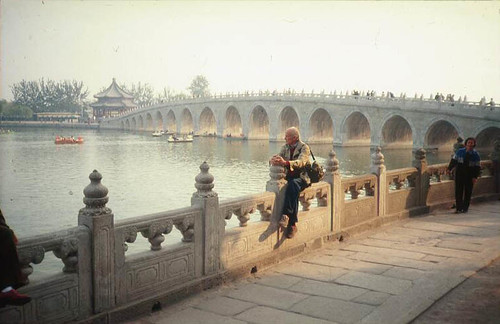
The 17-arch bridge
We choose the Summer Palace (Yi He yuan) for a “good bye China”. The palace is situated in an immense park, 20 km from the center. The Emperors used it since 1153 as a summer residence, an escape from the ferocious heat. Empress Cixi (Tsen hi) who reigned from 1881 to 1908 named it “Garden of Harmony”.
First of all we go toward Kunming Lake with its 17-arch bridge. Along the lake we enter the Long Corridor (700m) decorated with mythical scenes. Here are landscapes of Hangzhou, its lake and hills where my mind returns for a while. At the end of the gallery a path leads to a temple at the top of a hill. From here we have a splendid view of the garden in green and early autumn colors around the lake with two beautiful white stone bridges. How nice look the glazed tiles of a temple twinkling on the sun.
Back to the lake we taste a fish, fished in the lake, in an ancient theatre turned into a restaurant. Exploring further we discover a place with some pretty pavilions around a pond. They say the Empress came here to rest in calms and harmonies of the garden. So we do, meditating on the unforgettable moments in this country.
Invisibly bonds keep us on the lake. The sun is setting down. Smiling children leaning on my shoulder look curiously at the words I am writing on my notebook. I feel melancholy thinking of the return.
The plane takes off…..soon we are high in the air…..China is yet far behind us but visions…..Chengdu, Leshan, Yangtze, Huangshan, smiling faces…. mingle with melodious airs and I think perhaps…I dreamed!

The 17-arch bridge
XIAN
CHENGDU
CHONGQING
YANG TSE-KIANG
GHUICHI
Mounts HUANGSHAN
HANGZHOU
GRAND CANAL
SUZHOU
SHANGHAI
PEKING
